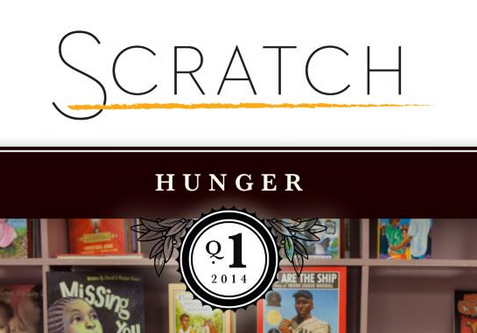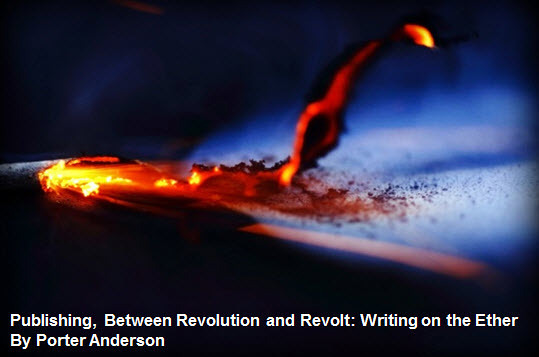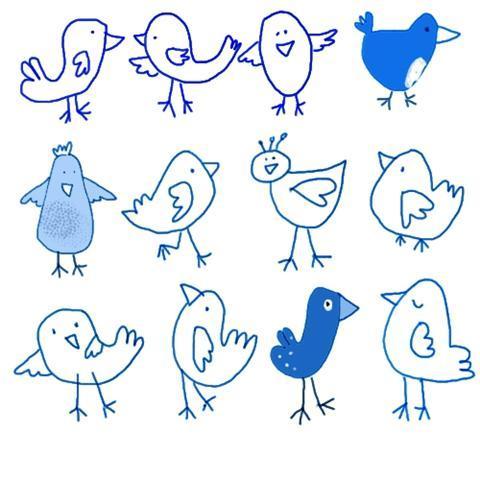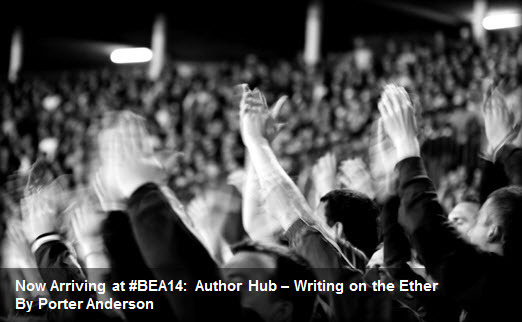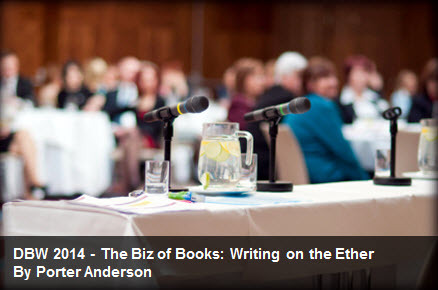Jane Friedman's Blog: Jane Friedman, page 166
February 6, 2014
Is Publishing a Class System?| Writing on the Ether
Table of Contents
Is Publishing a Class System?
Jane and Jason: “Inclusion of All Paths”
Don and Doubt: “Not the glorious revolution”
Hugh’s House: “Commitment to Advocacy”
Philip and the perplexity: “Amazon will roar back”
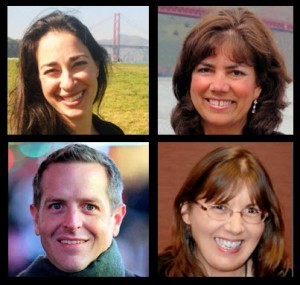 Who Is Headlining the uPublishU Author Hub?
Who Is Headlining the uPublishU Author Hub?Meet these bestselling charter members of BookExpo America’s all-new center for entrepreneurial authors. Clockwise from upper left: Bella Andre, Barbara Freethy, Hugh Howey, and CJ Lyons.
Join them in networking with industry players on the trade show floor. Basic membership includes your BEA badge, uPublishU Conference access, the New Title Showcase, BEA Show Planner, and Mobile App listings. Premium membership adds a dedicated meeting table and chairs in the Hub and a BEA Autograph Signing session.
For info and registration, contact Fred Evanko: 203-840-5965 or fevanko@reedexpo.com
Is Publishing a Class System?
What is important are the ethics of publishing.

Baldur Bjarnason
If I knew what’s good for me, I’d just thank Baldur Bjarnason for that line and meet you in the comments section below, right?
Well, not so fast. After all, this is the Ether, so you’ve already packed a lunch. And, yes, Victoria Noe (a newly registered member of the BEA uPublishU Author Hub) is waiting to tell me that Mercury retrograde is having tidal effects on my Campari.
But listen to the sobering but resilient tone in Bjarnason’s Intermission: sorting through the banal. His comments are part of a long, personal assessment being echoed by other strong, sensible voices in the mix right now.
The only danger is that what you hear doesn’t always sound like happy talk. It could be misconstrued as “depressing,” “negative,” “downbeat,” “pessimistic”…and how many such words have you heard thrown onto the fire of publishing’s distress in the last few years?
In truth, these comments and developments, appraisals and assessments—some very pointed, others more exploratory—have these things in common: candor, surprise, and exhaustion, as in the healthy exhaustion that arrives when we stop struggling and face up to some long-developing realities.
To the young man who offered me his hand to help me over the slush at the corner of Lafayette and Astor: you are a sweetheart.
— Ginger Clark (@Ginger_Clark) February 5, 2014
Here’s how Bjarnason goes on after saying that what’s important are the ethics of publishing. I’m bulleting his points to make them easier to parse:
Don’t choose a publisher who prevents you from self-publishing as well.
Don’t choose a publisher who by offering insulting contracts treats you like ignorant chattel.
Don’t choose a publisher who expects you to do all the marketing.
Don’t be the self-publisher who uses misleading covers.
Don’t be the self-publisher who treats cover designers worse than a large publisher treats a first time author.
Don’t buy reviews.
Don’t try and trick people into buying your books.
Have some dignity and don’t release books that violate every platform’s terms of service.
Make sure all the contracts you sign are honest, fair, and ethical.
Make sure all of the contracts you offer are honest, fair, and ethical.
Painful irony to tweet an article about paying writers for work they do by a site who do not pay their writers http://t.co/J6jQqTAn6s
— Jonny Geller (@JonnyGeller) February 6, 2014
In Bjarnason’s Ten Commandments (yes, I counted), you’re reading references from sock puppetry to Kobo’s “EroticaGate” in its UK online store. These are defining episodes in the digital transformation of the business which now can be understood to have taught us something.
The phrase inflection point refers to a changed curvature. The point is a place in which curvature changes from convex to concave, or the other way.
What if we’re far enough along on publishing’s long, tortured curve into its digital future that we may be at or near an inflection point in how we gather, sort, and evaluate where we are?
But what if we’re rounding the bend only to find a new dilemma waiting?
What if we’re moving from what one revered observer calls an effort to transcend the idea of two classes of authors — to what another highly respected commentator says is a three-class system?
"I don’t believe quality rises to the top—it fights its way there,“ @JaneFriedman interviewed by @jasonashlock https://t.co/agBKdXgyGv
— Darrelyn Saloom (@DarrelynSaloom) February 5, 2014
Jane and Jason: “Without Two ‘Classes’”

Jane Friedman
By now, I hope you’ve found agent and consultant Jason Allen Ashlock’s interview with Ether host Jane Friedman in her capacity (and she has a lot of capacities) as co-creator and -editor with Manjula Martin of the new Scratch Magazine.
The article, Writing + Money + Life awaits you in the spacious, interactive realm of Medium. You can leave comments as you read. (Annotation is at hand, in case this is still new to you. Eureka and woot.)
One of Friedman’s comments highlighted by Ashlock is:
What we’re getting right about author education: the increasing acceptance and inclusion of all paths to publication in educational programming, without two “classes” of authors, and the increasing hands-on opportunities for authors to learn about tools and technology that will empower them.
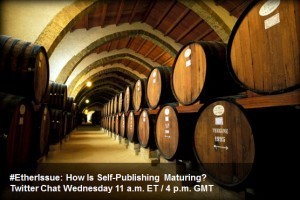
Image – iStockphoto: PacaYPalla
And this is what you could hear yesterday in our #EtherIssue live discussion in the Tweeterie for Publishing Perspectives. Based in our background story, Issues on the Ether: Howe Is Self-Publishing Maturing?, the lively exchange of views spun around just such a concept as Friedman is highlighting. I’ll show you a couple of parallels.
In talking with Ashlock, Friedman goes on:
What we’re getting wrong usually amounts to one-rule-fits-all-advice, with little room for the individual author to scope out his own path based on his strengths and the unique qualities of his work. I can’t tell you the number of times I’ve had to tell authors, “No, you don’t have to use [XYZ social media platform] if you don’t like it.”

Dan Holloway
That observation was echoed in the #EtherIssue debate by a call for tolerance—for support of individual creativity and drive and concept—that UK-based poet and author Dan Holloway brought to the table. (Holloway is speaking, February 28, at the London Author Fair.)
His phrase is “diversity” and he sees it threatened, as he explains in a comment on the Ether:
The real glory of self-publishing’s diversity is that each strand within it does not have to, should not have to, place itself in the context of an orthodoxy…The reason why it is important that we keep pointing out that this diversity is not and should not be related to a fundamental “standard model” is that each of these strands deserves its voice to be heard, each should be heard, and the media should be talking about each.
@balespen absolutely. My frustration is that the media doesn't cover more of that kind of single-minded experimentation #etherissue
— Dan Holloway (@agnieszkasshoes) February 5, 2014
And if you’re finding it hard to hear or be heard in such discussions, let alone in the marketplace, Friedman is right there with you.

Jason Allen Ashlock
In response to Ashlock’s prudent question about changes in publishing, Friedman tells him:
Because all the gates are open, and so many people are experimenting, it’s tough to break through the noise. Plus there’s not enough time to consume all the great stuff that exists. I don’t believe quality rises to the top—it fights its way there, then it fights to stay there amidst other distractions.

Chuck Wendig
One of the more wrenching but healthy elements of the debate along the digital curve here is just that: does the plethora of ill-prepared, amateurish junk being published with digital tools bring down the entire canon and damage even the best practitioners?
It’s what hybrid author Chuck Wendig describes with characteristic flair, the Self-Publishing Shit Volcano.
Some say not to worry: the bad work sinks, the good rises, no harm done by the ongoing lava runs of the self-publishing eruption. Others have something more Pompeian in mind.
@Porter_Anderson @pubperspectives Important to see these as separate roles and skill-sets. Why I prefer term "author-publisher." #EtherIssue
— Chuck Wendig (@ChuckWendig) February 5, 2014
The good news here is that a rousing hashing of these issues, as we saw on #EtherIssue, can be accomplished without the seething, sneering exchanges that once were self-publishing’s most animating feature. If exhaustion is helping us anywhere, it’s in the snot-nerds who may have worn themselves out screaming about how much they hate New York.
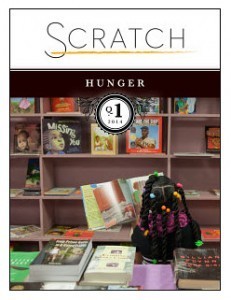 It’s easier to put the shriek-fest behind you—and re-think whether the blogs you frequent are helping you focus or just raising your blood pressure—when you read Friedman saying this:
It’s easier to put the shriek-fest behind you—and re-think whether the blogs you frequent are helping you focus or just raising your blood pressure—when you read Friedman saying this:
People gravitate toward communities or brands or people that deeply resonate with them, that lend meaning and identity, or that align with their needs or values. I know that writers hate thinking of themselves as brands, but if they can at least see themselves as a unique voice, with a unique position or perspective on the world, that can help create a plan or strategy that encompasses many possible models for creating content and services, particularly models that connect directly with readers, and go beyond the traditional pitch-and-publish gatekeeper model.
Friedman mentions “two ‘classes’ of authors” to Ashlock. She’s referring, of course, to traditionally published and self-publishing authors.
Hold on as the publishing curvature sharpens just a little.
Someone else is talking “classes” of authors, and he’s doing it a different way.
Don and Doubt: “The New Class System”
What’s happened is an evolution of the publishing world into a new class system, and like any class system it has winners, losers and opportunities. It’s a system that, if not recognized for what it is, will trap frustrated writers in a pit far more hopeless than the one they yearned to escape.

Flickr Creative Commons: Jonathan Kos-Read, from Writer Unboxed
We’re not in Friedman’s Kansas anymore. Agent Donald Maass, a fellow contributor with Friedman (and me) to Writer Unboxed (WU), has just fired The New Class System over the bow of the Good Ship SelfPub as part of WU’s focus this month on the industry! the industry!
It’s safe to say, at least here in the bunkered security of the Ether, that our good colleague Maass has at times found it necessary to offer not only his keen insights into writerly effectiveness but also his wary views of digital’s incursions into the realm. In this post, he looks to make what he later (in comments) calls “my cheeky view of the state of the industry.” Like many, he has made adjustments from time to time. Unlike many, he brings a handsome dexterity to the job, producing such Gatekeeper Anonymous scriptures as these from his new essay:
It’s true that I’m a gatekeeper, a longtime member (to my surprise) of the industry establishment. But I am no worshiper of the old ways. Traditional publishing always was cost-heavy and inefficient. It’s a wonder that it worked. But the new electronic “paradigm” is not the glorious revolution that true believers would like it to be.

Donald Maass
That, I believe, is candor, and I thank him for it.
His essay at times, yes, sets out a given without a take. For example, he notes that “low-cost/high-margin ebooks have been a bright spot” for publishers without mentioning that those high margins are due, in part, to publishers’ refusal to raise digital royalty rates for authors above 25 percent.
He does get to this, again, in that benedictory comment, in which he writes:
Print publishers will learn new digital strategies and, slowly, be forced into—hear me now—higher digital royalties. Competition will make it necessary, and indeed it’s happening around the edges already. A more profitable picture for authors and better online strategies by “traditional” publishers will make that option newly attractive and its downsides less depressing.
I think he’s right in his perspective, as laid out there, on the digital royalties issue.
But I wonder if, in celebrating how ebooks have “kept publishers profitable even as brick-and-mortar book retailing has shrunk and consumers have grown cautious,” Maass anticipates being joined by our entire choir in the cheers he leads. Probably not. He’s pretty savvy to the divisions of opinion and purview around him.
The new "class" system in publishing has stirred some comment. Do literary devices still have an effect? Maybe so. http://t.co/6QOjt1YFZZ
— Donald Maass (@DonMaass) February 5, 2014
More to our point here today is his delineation of his “three classes.” I’ll leave it to you to read his fully-fleshed detailing of his thoughts, and just give you now those classes with his top-line descriptors. Maass offers immediate seating in these classes:
Freight Class. “Self-published authors and electronic micro-presses must haul themselves…While the Kindle bookstore can be an incubator of innovative fiction, for the most part it is an ocean of genre imitations if not amateurish writing. ”
Coach Class. “Here we find decently-written literary fiction and nicely-crafted commercial fiction that achieves print publication but sells best at trade-paperback level ($14.99 or so), or discounted in e-book form. Coach Class novelists support each other yet find it difficult to gain a foothold with the public…Coach Class authors, however, are professionally edited and get goodies like nice covers, ARC’s, and plenty of blurbs. Plus, their books are in bookstores, a big boost in visibility.”
First Class. “The cream class gets a double shot of extended life in bookstores, both in hardcover and later in paper. Their books can sell well at $25 and live long in trade paper. For First Class authors, success looks effortless…Lines are long at BEA booth signings and readers are fiercely loyal.”
You see easily how the inflection here may look concave to some and convex to others.
Many will nod in agreement that All Gaul is indeed divided into these three parts. Maass Aurelius has sized up our current Rubicon with the alacrity and charm for which we all like him.
should probably study for the maass test soon…
— ♡ Phoebe ♡ (@itsphoebe) February 5, 2014
On the other hand, many moderns will quickly rush to point out that Maass has not enunciated the term “hybrid” or some other acknowledgment of the more fluid model of career production being built by, for example, the bestselling authors featured in today’s promo at the top and bottom of the Ether for BookExpo America’s uPublishU Author Hub.
Maass does assert that because “authorship is a true meritocracy…you can change your class, though of course it’s not always easy to do so.” Be a better writer, he’s saying, claw your way out of steerage. Yes.
But is that enough? Even as Maass leaves us whistling past those never-speak-them issues of (shhh) talent and skill, writing, “You can change your class by yourself, right at home, one keystroke at a time,” there’s surprise to be factored in.
And one such instance was being announced just as Maass’ column ran this week.
Doing the writing exercises in the Maass book! Did this one watching swimming class – with my notebook shielded ;0) pic.twitter.com/Q5O5tyjdGw
— Emma Greenwood (@emmajgreenwood) February 4, 2014
Hugh’s House: “Commitment to Advocacy”
Overseas publishers are so nimble and creative. They get putting the reader first. I can’t wait to see what they [Random House UK] do with Sand.
[image error]
The “Sand” omnibus cover is by Jason Gurley of Portland
When I reached Hugh Howey in Taiwan—he’s there for the 2014 Taipei International Book Fair—he was adamant, “thrilled,” about his new contract with Random House UK’s (RH UK) Century imprint for both the print and digital publishing of his new novel Sand (US here, newly in the UK here from Cornerstone Digital, part of Random House UK).
(Some readers are letting me know they hadn’t realized that Howey would sign over digital rights. In fact, RH UK’s publishing deal for all three books of the “Silo Saga” trilogy included digital as well as print. The Sand contract replicates that model. Howey has written that he has “far less of a problem signing digital rights overseas.”)
This is the guy many might have assumed was so thorough a torch-bearer for self-publishing and so outspoken a champion of entrepreneurial authors that he’d throw scones at the huge traditional British house that wanted to handle his new work.
Not so. Howey is among the most candid of the major successes in our ranks. He told me in a #PorterMeets interview for The Bookseller in December, ”I love working with publishers. Especially if they are flexible and want to partner rather than own.” RH UK is that to him.
Publishing Wool, Shift, and Dust with RH UK last year was a good experience for him. So good that he was ready to go back, although his Stateside experience is not the same. (The print-only deal for Wool with Simon & Schuster is for the first book of the trilogy only.)
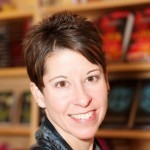
Kristin Nelson
And in writing up Hugh Howey re-signs with Random House UK for The Bookseller, I picked up on some of the open letter with which Kristin Nelson, Howey’s agent, announced the UK deal, I was struck by her taking the chance to make this point:
Every negotiation is an opportunity to create a tiny bit of change in how publishing works in this global landscape. If there is one thing that I want you to know about Hugh and me, his literary agent, it is this: we are committed to advocating on behalf of change for authors in this rapidly evolving industry. For anything within our power. Always. And this commitment to advocacy takes time and many conversations.
Nelson’s is a different message than the one you hear from her literary-agent counterpart Donald Maass, isn’t it? (Mr. Holloway, we’ve got your “diversity” right here.)
Howey’s upcoming appearances this spring include the PubSmart Conference in Charleston (an early-bird rate extension lasts to the 14th); London Book Fair’s Publishing for Digital Minds Conference (first early bird deadline is Friday, February 7, for best prices); the annual Klopotek Publishers Forum in Berlin; and the newly created BookExpo America (BEA) uPublishU Author Hub on the floor of the trade show in New York City.
And, by they way, the blog post headline under which Nelson’s message appears at Howey’s site, “A Letter from ‘Lil Kris,” is the author’s reference to Kristin Nelson’s affectionate “rap nickname” among her clients, who include Howey’s fellow self-publishing and hybrid bestsellers Barbara Freethy, Jasinda Wilder, and Courtney Milan, as well as the literary novelists Jamie Ford and Josh Malerman.
One update to our Bookseller report: we now have a date of June 19 for the release of the UK hardcover edition Random Century will produce. Pre-orders on the Amazon UK site are open.
Philip and the perplexity: “Amazon will roar back”

Philip Jones
Some publishers have over the past year suggested to me that their physical business through Amazon has stopped growing, with the shift ameliorated by the growth in their digital business through the Luxembourg giant. There have been suggestions that Amazon was deliberately switching its business, driving more customers to digital at the expense of print, rather than losing sales impetus. But with e-book sales also coming off the boil, where does this leave overall growth?
In What do we do if Amazon stops growing? at The FutureBook, The Bookseller’s Philip Jones explores the fact that “We have for so long thought of Amazon as a dominant player in the books market, that we might have forgotten to think about what will happen when the giant retailer stops growing.”
 This is a carefully poised write that recognizes, as Jones notes, “We can never write off Amazon.” Of course not. And the indications he cites of slowing growth in the UK (like ebooks, not business but growth-of-activity, mind you) are not surprising to those who understand that adoption curves and commercial insurgencies have natural dynamics and predictable changes in pace.
This is a carefully poised write that recognizes, as Jones notes, “We can never write off Amazon.” Of course not. And the indications he cites of slowing growth in the UK (like ebooks, not business but growth-of-activity, mind you) are not surprising to those who understand that adoption curves and commercial insurgencies have natural dynamics and predictable changes in pace.
What’s important in Jones’ positioning of the moment on this big, long curve of publishing’s digital disruption is what he smartly identifies as a double-bind for publishers—both a conundrum and a chance:
They [publishers] gripe about Amazon’s dominance but won’t want to see growth rates flatten. But they will also see that this represents a moment for them to take a lead in growing sales: something we can see a hint of perhaps in last week’s deal between Penguin Random House and Sainsbury’s to give away e-books on cereal packets. It also opens up a gap for another competitor to come in and stimulate the market, with my money on Tesco’s spring launch of BlinkBoxBooks, about which publishers seem unfeasibly excited. Amazon will roar back, for sure, but others may find their voice.
And now it’s time for you to find yours. Tell me if you, too, detect shifts in our dialog, in the way we understand where we are and debate where we may go.
Can you hear perspectives coming together in patterns you can detect and start to depend on? But are those patterns the formation of new classes? Could they be, in fact, the firming up of old classes? Are we closer to a more egalitarian stance for authors and other publishing professionals now? Or have we not even started to turn the corner of that curvature?
Getting weary of financial and economic analysis from English majors.
— Don Linn (@DonLinn) February 6, 2014
 Who Is Headlining the uPublishU Author Hub?
Who Is Headlining the uPublishU Author Hub?Meet these bestselling charter members of BookExpo America’s all-new center for entrepreneurial authors. Clockwise from upper left: Bella Andre, Barbara Freethy, Hugh Howey, and CJ Lyons.
Join them in networking with industry players on the trade show floor. Basic membership includes your BEA badge, uPublishU Conference access, the New Title Showcase, BEA Show Planner, and Mobile App listings. Premium membership adds a dedicated meeting table and chairs in the Hub and a BEA Autograph Signing session.
For info and registration, contact Fred Evanko: 203-840-5965 or fevanko@reedexpo.com
Main image – iStockphoto: FilmFoto
The post Is Publishing a Class System?| Writing on the Ether appeared first on Jane Friedman and was written by Porter Anderson / @Porter_Anderson.
February 5, 2014
What’s Different About Running a Magazine Today (Versus 5 Years Ago)?
Earlier this week, I was interviewed by Jason Allen Ashlock about my new digital magazine Scratch, and how things have changed in the magazine publishing world since my days at Writer’s Digest.
Here’s a bit of what I had to say:
It’s more difficult to turn a profit on a magazine, whether print or digital. People expect they can get quality information for free, and the magazine package (or experience) isn’t as valuable as it once was. People cherry pick a lot, rather than committing to single publications or outlets. I suspect that if and when Scratch becomes sustainable for the long term, it will be a result of additional content and services we develop, not subscription revenue.
It’s a wide-ranging conversation, and I also touch on:
good and bad trends in author education
exciting changes in the publishing industry
a digital-inspired publishing effort that inspires me
Many thanks to Jason for the excellent questions. Read the full interview.
The post What’s Different About Running a Magazine Today (Versus 5 Years Ago)? appeared first on Jane Friedman and was written by Jane Friedman.
February 4, 2014
The Challenges and Opportunities of an Omniscient POV
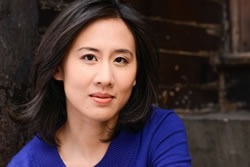
Kevin Day Photography
The most prevalent point-of-view used by writers today is the third-person limited POV (sometimes spread across multiple characters), as well as the first-person POV.
It’s pretty rare to find a contemporary novel written with an omniscient narrator—which is why Celeste Ng found it a terrifying realization, while writing her first novel, that her story required one. She says:
The idea made me incredibly uncomfortable. To me, omniscient narrator called to mind the Dickens model: a Big Booming Voice who bossed the characters around, a know-it-all who judged everything. Someone very unlike me. As a shy person, I’d always rather listen than talk, and I seldom feel comfortable making definitive pronouncements.
But she found a way of thinking about it that made it work. Click here to read her entire essay on the “quiet” omniscient narrator, which appears in the latest Glimmer Train bulletin.
Other pieces in the bulletin:
The Place Where Writing Grows by Natasha Tamate Weiss
On Quelling Writerly Doubts by Molly Antopol
Some Material May Not Be Suitable for Children by Peter Sipe
The post The Challenges and Opportunities of an Omniscient POV appeared first on Jane Friedman and was written by Jane Friedman.
February 3, 2014
Think Local: It’s Not Just for Food
Today’s guest post is by author and freelancer Andi Cumbo-Floyd (@andilit).
On one side of the street, they sit next to the plastic stand that holds paper menus for customers to take home. Across the road, they’re squeezed next to pretty, spangly watches where people pick up their prescriptions. Just north, 10 copies are stacked, spine out, on the counter of a hair salon, partially obscuring the wall of conditioners and sprays.
My books are for sale in local places—and they are selling well.
My best sales successes have not come from bookstores or guest blog posts, not through Facebook ads or even nationally broadcast radio programs. My best sales have been in the local stores of my hometown.
The pharmacy where I had my first job—a tiny shop in a tiny strip mall in a county with one stoplight—has sold more than 15 copies of my book, and the owner just texted me to ask for more. The restaurant that specializes in home-cooking and whose owners sang with my mom—they sell out on a weekly basis. The hair salon asked for a dozen copies to start their sales, which is more than I’ve sold on Amazon all month.
These small shops, along with talks in the area where I grew up—and about which my book is written—are getting my books into the hands of people who really want them. And their appreciation for my work is giving me confidence to push into bigger, broader markets.
So if I had to offer advice for marketing a book, whether you traditionally publish or self-publish, here’s what I’d say: THINK LOCAL.
No matter the subject of your book, your hometown folks will often be your biggest supporters. They are invested in you and your work, so help them help you.
Ask local shops if they’ll sell the book, on consignment if they prefer. Make them a sign to put near your books and check in regularly to be sure they have a steady supply of copies. Then let people know that they can get your book there. You’ll be helping the businesses while you also market your work.
Give talks in your area and invite the public to attend. Make flyers and send them to community groups and churches. Create a Facebook event and invite all your friends from high school. Get the word out in any way you can—and be sure to have books on hand to sell and sign after the talk.
Make sure a local reporter covers your talk and tells people where they can buy your books locally. Get them photos if needed. Provide a free copy of your book. Thank them personally for coming to your talk.
Contact local schools to see if they have interest in you talking to their students, whether on the subject of your book or about writing and researching the work. Maybe there’s a community college nearby that would host a lecture with you.
Say thank you. Write a letter to the editor of the local paper to thank your community for its support. Give a note of thanks (and maybe a bottle of wine) to the shop owners who carry your book. Call out thanks on social media. Show your gratitude whereever you can.
As a writer, you absolutely want to go after bigger platforms—NPR, the Los Angeles Times, Oprah—but in the process, don’t forget that your hometown holds your roots and holds you up. They’ll be thrilled to show you off, and when Oprah promotes your title, they’ll probably throw a party at the local restaurant to watch. You wouldn’t want to miss that, would you?
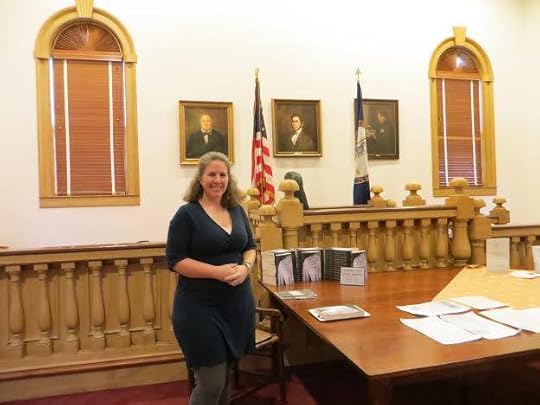
Andi Cumbo-Floyd
The post Think Local: It’s Not Just for Food appeared first on Jane Friedman and was written by Andi Cumbo-Floyd.
January 30, 2014
Publishing, Between Revolution and Revolt: Writing on the Ether
Table of Contents
Lit
Smart Rebecca
Hugh and Cry
Combat in the Community
If You See Us Running…
Lit
Follow that burning fuse. It runs between these two curiously different words. We may need to think about which of them is closer to us.
Revolution. Pretty comfortable. Thanks to Madison Avenue, we nowadays say “revolution” for every change, from geopolitical alliances to bathroom tissue.
Revolt. Not so comfortable. More acute. Something or someone feels out of control. It’s an uprising, not a downfalling. Dangerous.
It seems to me that the phony war is over. Publishers are now looking at a market that will no longer drive itself, but needs to be driven, whether that is through product development, author acquisition, price promotion, consumer marketing, or international expansion. The game is on: and these changes are speeding up, even as the growth curve flattens.

Philip Jones
I’ve started at the end of Philip Jones’ meditation The World Is Not Flat at The Bookseller’s The FutureBook site. Jones opens by acknowledging that “thinking of this as a flat market seems spectacularly unhelpful.”
And having surveyed various assessments of market trends, he cautions, rightly, “We should be careful about the conclusions we draw from all this data gathering.”
Jones references one of Mike Shatzkin’s recent posts, The Future of Bookstores Is the Key to Understanding the Future of Publishing, and he deftly steps aside just as the sparks of our lit fuse go by, emphasis mine:
Mike sees bookstores as the canary in this particular mine. Others look to the steady drip-drip of successful self-published writers as the true indicators of how difficult the future might become for publishers: that some indie authors believe they are leading a revolution should worry everyone in the trade.

Matthias Matting
And one day later, we have word from another journalist, our good colleague in Munich, Matthias Matting—emoticon his:
Der 29. Januar 2014 müsste eigentlich in die Geschichte eingehen – heute kommen die zehn meistverkauften eBooks bei Amazon erstmals alle von unabhängigen Autoren. Das erste Verlagsbuch hat es gerade einmal auf Rang 11 geschafft. Glückwunsch allen Beteiligten

In his short squib in The Self Publisher’s Bible, headlined Ein Tag für die Geschichtsbücher: Die Amazon-Kindle-Top-10 komplett von Self Publishern belegt, Matting is telling us that the 29th of January marked the first time that every one of Germany’s Top 10 Kindle sellers on Amazon has been a self-published book.
He offers congratulations to everyone involved. And a smiley face.
Match struck. Fire to fuse.
Interesting news from the German ebook market: https://t.co/2P957y7yCJ @Porter_Anderson @barryeisler @jakonrath @thecreativepenn
— Sebastian Posth (@sposth) January 29, 2014
Smart Rebecca
Until recently we had good reason to push all our ‘product’ down the same shaped pipeline, because that was all we had as a route to our readers…This pipeline is a cracked, crumbling edifice that reinforces our siloed existence and stifles innovation, and yet we are locked in by the need to maintain legacy revenue.

Rebecca Smart
Just posted by The Bookseller in London, you’ll find those powerful words in Harder, better, faster, stronger, a compassionately intense essay from Rebecca Smart, the eloquent CEO of the UK-based Osprey Group, an independent publishing company.
As I said in my #PorterMeets interview with her (also in Friday’s edition), when Smart speaks hard truths like this, she always includes her own company’s issues. No dodges, nothing holier-than-thou about her.

Rebecca Smart’s team is in beta with an enthusiasts’ hub for nutrition and diet.
This is one reason she is listened to when she talks from experience of the “15 to 18 months’ worth of books at any given point” in that long, old pipeline. She writes:
Let’s allow books to find their readers in a time frame that is most appropriate for the author, the book and the readers, not our sales process and teams. We need increased flexibility in deals between publishers and authors. Marcello Vena has talked about what RCS Libri [based in Milano] are calling ‘co-publishing’, hinting at the idea of different service levels for authors, with different types and levels of remuneration.
There is much more to Smart’s essay. In her interview with me she explains, “It’s about how we need to treat each project differently, on its own merits.”
Hear that fuse’s flame? Is it close?
@Porter_Anderson As will the peasants with torches and pitchforks. @SheilaB01 @rebecsmart
— Don Linn (@DonLinn) January 28, 2014
Hugh and Cry

Hugh Howey
You’ve heard a lot about Hugh Howey lately, haven’t you? Do you know why? I’ll give it to you in one passage from him:
I stand for the ability of those who choose to write for a living to have the best opportunities possible. It’s a narrow focus, but it’s one I’m passionate about. I’ve been passionate about this for longer than I’ve been writing. It goes back to my book review and bookstore employee days. As a reader who loved stories, I cared for those who created them. Now that I’m on the other side and have become friends with storytellers, this cause is strengthened. And the more I learn about the abuses authors suffer, the more I want to speak out.
What we haven’t had before now is a bestselling spokesperson for the entrepreneurial dynamic in publishing who combined a high level of self-publishing success with an articulate grasp of challenges in the industry! the industry! …plus the artistic respect of a big swath of publishing community members who have read his work…plus the willingness to spend a lot of time and energy analyzing and addressing what he sees as publishing’s major issues…all without anger as a prime motivator or vehicle.
Howey is as serious as a silo after a nuclear attack, but that’s not a chip on his shoulder. That’s the burden of respect he wants to help establish for writers of every stripe, from hobbyists to poets laureate.
It's not really a secret except that many of us still ignore it. Hugh Howey doesn't: http://t.co/OLGDb21J6t #donotprocrastinate
— Lucas Bale (@balespen) January 30, 2014
The passage I’ve quoted above is from Howey’s essay Bread and Roses, in which he takes on the leadership of the Authors Guild, offering his suggestions for a seven-point platform for the organization. By the end of that piece, he’s writing:
Imagine what would happen if authors stood together and the Big 5 publishers were unable to sign new contracts for three months. Small presses — where authors are given fairer contracts but more limited distribution — would get a much-deserved boost. Independent authors would get a much-deserved boost. Readers would finally have a chance to catch up on their TBR piles. And the short term loss from debuting and renewing authors would be offset by long term and permanent gains across the profession. It would be an amazing stance for writers to take in order to stop the current squeeze on e-book royalties. Where again, let me repeat, publishers are making record profits on the backs of artists, and no one is doing a thing about it.
That article is one of several (including Don’t Anyone Put Me in Charge; My Second Month on the Hypothetical Job; Lil’ Kris in da House and Turning Chaff Into Wheat) that, taken together, could be considered a growing, collective position paper for entrepreneurial authors.
When I called Howey’s “Bread and Roses” article to the attention of a private email group of industry players—the article’s title comes from a 1912 labor action led by women—the piece was met by handsome praise for Howey’s fiction and several dismissive comments about his industry-political views. No “commercial sense,” was one response, although no one referred to Howey’s specific writings about the Authors Guild.
Howey’s proposed platform points for the Guild include:
No more digital rights until ebook royalties are 50 percent of net
No more “Most Favored Nation” clauses
No more DRM for Guild members
Fair pricing for ebooks
No more non-compete clauses
Stop fighting “free”
The Authors Guild should embrace Amazon as a friend to writers and readers
Among the responses exchanged by these industry listserv members (by policy, I won’t attach names to comments), one of the most pointed was an assertion that independent authors have captured only “a minuscule percentage” of overall book sales.
Howey calls the Authors Guild (under outgoing chief Scott Turow) an organization “fighting for publishers and for bookstores — the very parties who stand between writers and readers.”
No reactions I saw refuted either that or any other point Howey landed about the Guild. Instead, criticism (most of it constructive but firm) focused on a perceived naïveté on Howey’s part and on an idea of self-publishing’s impact being very limited.
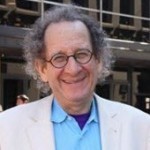
Mike Shatzkin
To see this kind of criticism for yourself, check the comments section after reading the same incisive essay from Shatzkin that Jones mentioned, on The Future of Bookstores. Here’s a link to the start of a comment exchange between Shatzkin and Howey.
A few phrases here—I urge you to read it all for yourself:
Howey: As for whether indies represent a sizeable piece of the publishing pie, I think that looks at things a bit backwards. What if a large chunk of that pie no longer needs to be spent at all?…What matters is not the percentage of gross sales that goes to indies vs. traditional publishers but the percentage of revenue that goes to authors.
Shatzkin: Hugh, your post is so thoroughly from an indie author’s POV that it is really not relevant to anybody else and, frankly, not to all indie authors either. Dollars are relevant to every retailer. Retailers are the path to the audience for everybody, not just big publishers…It is doubtful to me that indies have 25% of all ebook unit sales everywhere, but, even if they did, they’d have a much smaller fraction of the ecommerce.
Howey: Yikes. I didn’t think my reply was aggressive or if you read it that way. Certainly wasn’t meant that way. Just pointing out my perspective, which is certainly biased. I’m the first to admit that.
Shatzkin: I didn’t think your reply was aggressive, Hugh. I just thought it was wrong. And I think you’re a helluva good writer and have achieved independent success that any author would be foolish not to take on board. But let’s just say that my respect for your expertise does not extend to your ideas about how publishers ought to operate.
Dear @4fifty1,
Please direct all inquiries about claiming the future of publishing to funded 19 year olds in Palo Alto.
Regards,
MB
— Michael Bhaskar (@michaelbhaskar) January 30, 2014
You know where I’ve heard Shatzkin’s comments before? From myself! From myself and from other news people when “citizen journalists” became a rude, unwanted, upstart presence in “our” network news.
We said just these things. Citizen journalists were a minuscule part of the overall picture in media coverage, we said. Citizen journalists, with their silly cell-phone videos, couldn’t hold a camera to our superb camera crews, we said. Citizen journalists, many of them fine folks, of course, knew nothing about how genuine journalism worked, we said.
What we couldn’t see as we said these things was that the digital disruption of journalism would neutralize most of our traditional models and modalities. The news audience would not rush to “genuine journalism’s” aid. And the ways and means of our industry would be profoundly shifted toward open access and non-expert participation.
See, we were wrong: every cell phone really was our competition. But we couldn’t see that, not then, not for anything, not even when we tried. And the upheaval in news continues, of course, as the frequent coverage of Mathew Ingram at GigaOm and the team at the Poynter Institute and others reveal.
Call me sentimental, but I LOVE it when a first novel scoops a major prize. Booker and now #costaprize to young writers.
— Jonny Geller (@JonnyGeller) January 28, 2014
To all who've sent kind messages about the @CostaBookAwards. I'm a bit lost for words, but here's a heartfelt thank you to each of you. Nx
— Nathan Filer (@nathanfiler) January 29, 2014
The upheaval in publishing is newer, and Shatzkin is an able representative of an industry-based observer who must try to get a more advanced overview than many of his peers. Please take it from me: that is not easy. I feel that I sit by this man every time I read his latest post.
Howey, by comparison, lives ahead of the change, by dint of very hard work and plenty of good luck (he’ll tell you that). He’s a provocateur of the best kind – motivated by his own success to enable his colleagues; to search out the opportunities ahead; and to define for us the perspective of an unprecedented workforce of independent creativity: the new author.
One of these commentators is industry-facing, the other is author-facing.
And that lit fuse? Just went sizzling right between them…sssvvtt! Keep your eye on it. And keep reading.
Awesome #infographic showing us what happens in one minute on the internet!! #socialmedia #digitaldisruption pic.twitter.com/icPFbditVp
— Rebecca Monforte (@MsMonforte) January 30, 2014
Combat in the Community
Howey’s not alone, of course.
Barry Eisler has been tirelessly outspoken on these issues, most recently in a much-debated exchange with Trident Media’s Robert Gottlieb, as I mentioned last week in “Our ‘Bifurcating Future.’”
Joe Konrath has spoken for years to these issues, of course, though much more frequently in tones of anger that may have made it hard for many to get the benefit of his observations. This can be the case for David Gaughran, as well.

CJ Lyons
CJ Lyons from time to time will enter the debate on how entrepreneurial authors see themselves in the business, as she did recently in this comment.
I heard Sylvia Day say at IDPF’s BEA conference last year that a publisher had to convince her it could do something that she couldn’t before she’d consider a deal. (And St. Martin’s Press, indeed, has signed her to two books for an eight-digit figure. Here’s Digital Book World’s carriage of the news release.)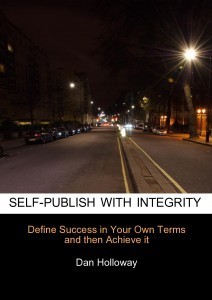 The UK’s Dan Holloway has become an increasingly important voice in the field, with Self-Publishing With Integrity…which we trust he has self-published with integrity.
The UK’s Dan Holloway has become an increasingly important voice in the field, with Self-Publishing With Integrity…which we trust he has self-published with integrity.
There are plenty more.
And at the risk of sounding like “Porter Provocateur,” myself, here (my role at Writer Unboxed), I want to propose to you that one of the key voices to listen to—with your children’s ears covered—is Chuck Wendig.
You want to get rid of the stigma [of self-publishing] once and for all? Clear the room of any bad smell? Good. Then it’s time to take a long look at the culture surrounding self-publishing. We’ve moved past the time where we need to champion the cause, okay? We’ve seen enough success in that space and have plenty of positive examples it’s time to stop acting as cheerleaders. And it’s time to start acting as critics.

Chuck Wendig
For some time now, Wendig has, in various posts and tweets, been trying to get folks to distinguish between the actuality of self-publishing and the culture of it. No easy task. So charged are some of these issues that you could really substitute the word “culture” with “emotions.” The emotions of self-publishing? Well, I’ll throw Wendig back under the bus and let him tell you in a few lines from his important post, Self-Publishing Is Not the Minor Leagues:
The attitude that pervades self-publishing is that it’s a good place to test your craft, to hone your work. We are reminded constantly that the cream floats to the top, that all the crappy self-publishing efforts have no effect on anything or anybody ever despite evidence to the contrary. The culture forgives and sometimes congratulates even the most meager of efforts because of how courageous someone is to take the plunge to publish their own work. The culture says, “Just click publish!” The culture criticizes the faults of traditional-publishing, but excuses (or celebrates) its own. And yet, sometime in the same breath, self-publishing gets painted as a path to traditional publishing, not as a path separate and scenic all its own. The culture is full of contradictions.
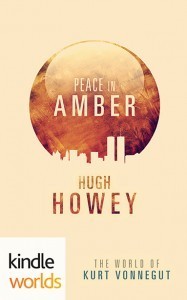 What may seem to be one of those contradictions is that one respectful colleague and naysayer of Wendig? —is Howey:
What may seem to be one of those contradictions is that one respectful colleague and naysayer of Wendig? —is Howey:
I cheer for the path and the freedom for anyone to publish whatever they want. The works I recommend to others are the works I find sublime. Everything else goes unmentioned. You’ll never find me encouraging people to throw a rough draft up on Amazon. But you’ll never find me castigating those that do. Why do I care? Who are they harming? Is self-publishing really going to be defined by those who expend the least amount of energy? If so, are we going to define traditional publishing by Snooki and 50 Shades of Grey? There are too many great books out there that need reading. Worrying about the poorly written and poorly edited books seems like a waste of time.
That’s Howey in a KBoards response to a point Wendig is making. The debate includes many others and runs to some 14 pages of discussion.
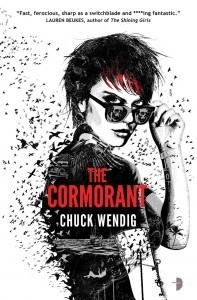 Wendig, in a response to Howey:
Wendig, in a response to Howey:
See, but again, you’re conflating “writing” with “publishing.” I celebrate writers of all levels at their careers or non-careers. Publishing, though, I think you have to stop thinking about yourself and start thinking about readers. And at that point, that means being your own critic, your own gatekeeper. Just my opinion, of course. I respect your point and I’m not out to inhibit anybody’s freedom here — just out to ask that they think about what they’re putting out in terms of the work.
This looks and feels like a big brawl to many. To me, it’s a far more sophisticated round of inquiry than we’ve seen in the past about the place, the purpose, and the posture of self-publishing in the industry today.
I just saw somebody on Twitter who I think meant to type "fuck" have it autocorrected to "chuck wendig."
This is my moment. I am profanity.
— Chuck Wendig (@ChuckWendig) January 30, 2014
Sure, the emotional folks will always slam in with lots of exclamation points and coarse language. They’re not the people you’re there for. If you can keep your head cool and listen quietly, you’ll hear a lot of writers inside the entrepreneurial community sorting through important questions among vastly disparate points of view.
There’s a second post to check out from Wendig: Readers Are Not Good Gatekeepers.
Here’s what he’s saying in that one to his fellow authors:
Asking readers to be your gatekeepers is putting a lot of responsibility on the people who are paying you. Stop saying you’re going to let the readers figure it out when it comes to sorting through what’s crap and what’s not. You need to figure that out. That’s on you.
And that fuse’s sparks are getting around.
Permissions: the hidden income stream for certain authors. The paperwork can be dry, but the money is not.
— Ginger Clark (@Ginger_Clark) January 29, 2014
If You See Us Running…
One of the participants in the industry email group I’ve mentioned asked recently if there don’t seem to be more conference-type events for entrepreneurial authors.
The answer is yes, there are. For example:
London Author Fair , February 28, is new and is the first in an international series of such conclaves. #LAF14
London Book Fair’s entrepreneurial authors are expanding this year under the branding Author HQ, April 8-10. #LBF14
PubSmart in Charleston, April 16-18, is new. (Early bird pricing ends Saturday and PS14PA30 gives you a discount.) #PubSmartCon
Grub Street’s The Muse and the Marketplace has some new emphasis this year on issues in the digital dynamic, May 2-4. #Muse14
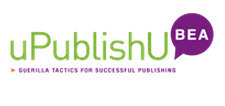 The uPublishU Conference, May 31 at BookExpo America (BEA), isn’t new this year, but its associated Author Hub on the floor of the trade show is debuting May 29-31. #BEA14
The uPublishU Conference, May 31 at BookExpo America (BEA), isn’t new this year, but its associated Author Hub on the floor of the trade show is debuting May 29-31. #BEA14Programming for the UK’s Literary Conference , June 13-15, was just announced. #TLC14
Writer’s Digest Conference East (August 1-3, New York City) and West (August 15-17, Los Angeles), are in their planning stages. #WDCE14 and #WDCW14
There’s more, of course, and you’re always welcome to check my Publishing Conferences page to see details.
All these voices and the pattern of the debate get me back to Jones’ The World Is Not Flat. This market is not simple. As Smart tells us in her forthcoming essay, the old pipeline cannot hold.
Remember what Howey wrote:
Imagine what would happen if authors stood together and the Big 5 publishers were unable to sign new contracts for three months.
Could that happen? The industry email group members laughed it off. Howey wrote:
Hey, I’m not advocating for a strike. Don’t misunderstand me. I would never do that. But maybe an Authors Guild would want to look into it. If we had one.
So is that “phony war” over? Is this the real one? Is there a new urgency here? Is that the sound of a lit fuse? You tell me.
That’s why God (and Jane Friedman) gave us a comments section.
There’s an old joke connected to bomb squads. I first encountered it in relation to a US Marines unit, myself, but I’m sure it’s been deployed by just about every force and field out there. Works really well on a T-shirt:
If you see us running? Try to keep up.
@juliebosman I see a Page Six headline for sure: "Drunk Author Winds Up in Bed with Matron of Park Avenue."
— Paul Bogaards (@paulbogaards) January 30, 2014
Main image – iStockphoto: GregAIT
The post Publishing, Between Revolution and Revolt: Writing on the Ether appeared first on Jane Friedman and was written by Porter Anderson / @Porter_Anderson.
January 23, 2014
Is the “Publishers’ Monopoly” Broken? Writing on the Ether
Table of Contents
Read It and Tweet
No Anti-Social Scientists, Please
“A Two-for-One Special”
Our “Bifurcating Future”
Read It and Tweet
A funny thing happened to me on Twitter this week.
I “crafted a tweet.” (Sounds so “artisanal” that way, no?) This was the kind of tweet in which I like to mention a new release from an author; its sales page; the fine publisher behind it (unless it’s self-published, no discrimination here); and the number of print copies that Publishers Weekly tells us the publisher plans for the launch. In this case, it was 50,000 copies.
Almost immediately, the author tweeted me. “Thanks for the tweet. But what 50,000 copies?”
I explained my source was Publishers Weekly’s listing and asked if it was incorrect?
No, no, it wasn’t that, this author told me. It was just that he had never heard the 50,000-copy figure. Or any other number. Despite the fact that 50,000 copies is a handsome number for a print run—the author was clueless on this point.
Now, far be it from me to embarrass one of our great publishing houses. So I won’t give you this one’s name. This is the fourth time this has happened. Different author, different book, and different publisher each time: I “craft a tweet.” Author tweets me back in happy surprise. Publisher has not shared with author what the size of the print run is.

Dana Beth Weinberg
This incident reminded me of something that Dana Beth Weinberg said last week at the Digital Book World (DBW) Conference & Expo in her presentation about the “What Authors Want” survey that DBW and Writer’s Digest (WD) produce.
She talked about partnership. Between authors and their publishers:
This new partnership needs to be genuine, not based in lip service, or it will backfire terribly. The approach is worth a try. If it can lead to better cars, more on-time airline departures and arrivals, and fewer deaths in hospitals, why can’t it also work in publishing?
 That’s from a written edition of her comments she has posted at her site. It’s called Should Traditional Publishers Feel Threatened by the Potential of Self-Publishing? Summary of My Presentation at Digital Book World 2014
That’s from a written edition of her comments she has posted at her site. It’s called Should Traditional Publishers Feel Threatened by the Potential of Self-Publishing? Summary of My Presentation at Digital Book World 2014
And her opening lines are these:
Should traditional publishers feel threatened by the potential of self-publishing? Of course they should.
@tobiasbuckell @pablod Oh, how I love anything involving reversions! I really do. It’s like the vigilante justice of publishing.
— Ginger Clark (@Ginger_Clark) January 22, 2014
No Anti-Social Scientists, Please
Weinberg is a sociologist, sometimes identified in bios as a social scientist. This, one assumes, is better than being an anti-social scientist. We’re looking forward to an actual meeting someday, having found more than a thousand conferees between us last week at the conference in New York.
Weinberg is a full professor at Queens College and the Graduate Center of CUNY. She directs the Sociology MA program in Data Analytics and Applied Social Research.
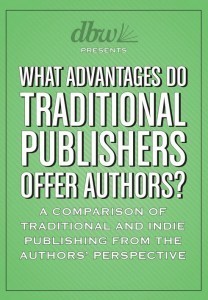 She’s been working for some time with DBW’s great team to wrangle elements of the survey for the conference and for other uses. Her and Jeremy Greenfield’s detailed rendition of some of the “What Authors Want” survey’s results is being offered by DBW on its site under the title What Advantages Do Traditional Publishers Offer Authors? A Comparison of Traditional and Indie Publishing From the Author’s Perspective for $295.
She’s been working for some time with DBW’s great team to wrangle elements of the survey for the conference and for other uses. Her and Jeremy Greenfield’s detailed rendition of some of the “What Authors Want” survey’s results is being offered by DBW on its site under the title What Advantages Do Traditional Publishers Offer Authors? A Comparison of Traditional and Indie Publishing From the Author’s Perspective for $295.
Weinberg tells me in an email interview: “DBW and WD embraced my suggestion that we make more of the information from the survey readily availalble to the author community than they have in the past. We have more blog posts and some special reports (likely priced at $2.99) planned.”
That sounds great to me. I look forward to learning more from it and, as she wrote to me this week, “getting a chance to have a real conversation one of these days.” In the run-up to the conference, Weinberg posted three articles relative to the survey at DBW’s site: The Self-Publishing Debate: A Social Scientist Separates Fact from Fiction, Parts 1, 2, and 3.
It’s in those writings, in fact, that Weinberg has specified along with the DBW-WD team, very responsibly, that the survey isn’t scientific. Its admirably large sample is self-selecting—voluntary, not screened or demographically controlled. Drawn primarily from the readership of Writer’s Digest, the survey’s respondent pool comprises more than 9,000 people, some 58 percent of whom say they have completed manuscripts. Put another way, more than 40 percent of them are aspiring authors.
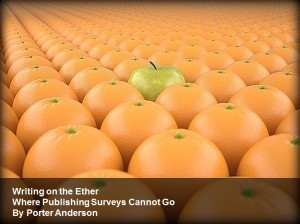 To get us all on the same page, a few housekeeping notes: This survey has floated on our gases here before.
To get us all on the same page, a few housekeeping notes: This survey has floated on our gases here before.
You might remember last month’s post (can it only have been last month?) Where Publishing Surveys Cannot Go.
It turned on author Hugh Howey’s concerns about the way author earnings are interpreted by the survey’s approach. His own initial piece is You’re looking at it wrong, and he has a follow-up on the matter, We don’t lose. We Create. We win.

Image: Mollie Howey
The kind of committed, cool-headed, and enjoyable commentary he wrote there shows you why Howey has become, as I wrote at Publishing Perspectives in If Hugh Howey Ran HarperCollins, perhaps our most articulate champion of professional self-publishing.
Howey and our Ether-eal host here, Jane Friedman, are the keynote speakers at the April 16-18 PubSmart Conference in Charleston.
If you’d like to join us, your discount code is PS14PA30 and early bird prices end January 31.

Jane Friedman
Friedman’s new online Scratch Magazine (on writing and money paid for it—or not) is produced with Manjula Martin and will publish its first full quarterly edition very soon.
And for some intriguing parallels in Howey’s and Friedman’s observations, see this 2012 piece from John Warner at Indie Book Spot, Interview: Jane Friedman on marketing and building an author platform.
In her comments to Warner for that interview, Friedman suggested that publishers:
Create a private online community for the publishers’ authors. Inventory who is strongest and smartest online/digitally and study why. Create opportunities for authors to help each other market and promote when audiences overlap. Run free educational webinars for authors on marketing, promotion, and platform development. Dedicate one staffer to harness the power of authors’ reach online. Create financial reward pools for authors who drive sales.
It sounds almost like a publisher-author partnership, doesn’t it? And, lo, how easily we return to our new material at hand. I said publisher-author partnership. So did Weinberg.
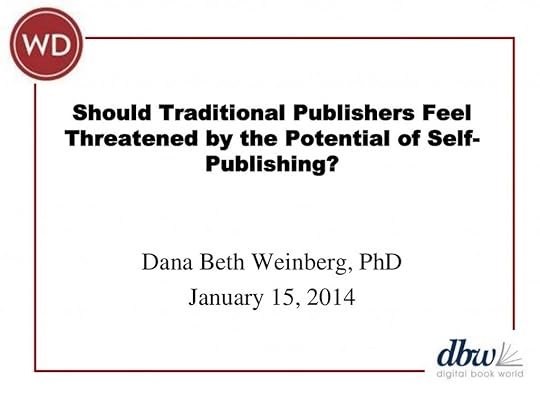
The title slide from Dana Beth Weinberg’s DBW 2014 presentation
“A Two-for-One Special”
As a hybrid author—an author who has both traditionally published and self-published—and a social scientist who studies the book industry, I am something of a two-for-one special at Digital Book World 2014. My remarks draw from both perspectives.
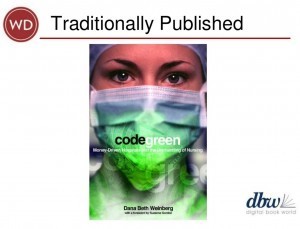
Dana Beth Weinberg is a nonfiction author published by ILR Press at Cornell. This slide is from her DBW 2014 presentation.
How quiet the Metropolitan Ballroom at the Sheraton Times Square seemed as Weinberg took her turn onstage a week ago. What the audience was learning is that Weinberg had arrived with more than “data-driven” urgency:
This conference has focused on the changing technologies in publishing, and I am going to focus today on the human equation, specifically the relationship between authors and publishers.
In correspondence, Weinberg tells me that her own connection to this work is, of course, personal as well as professional.
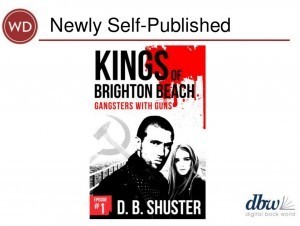
Dana Beth Weinberg has just self-published for the first time, starting a work of serial fiction with the pseudonym D.B. Shuster. This slide is from her DBW 2014 presentation.
“As a novelist,” she says, “my own personal interest in pursuing better data was to understand the market and my own prospects.
“On the other hand, the data mattered not at all. Whatever the odds, every writer has to believe they have the potential to beat them–to get an agent, or find a publisher, or rise to the top of a bestseller list, or whatever the dream is. Publishing itself–putting your work out for others to read and evaluate and criticize and hopefully love–takes an immense amount of courage.
“It requires that authors have faith in their writing and in the stories they’re compelled to tell. ”
Many times I’ve said (to people tired of hearing it from me) that one of the remarkable aspects of traditional publishing is that it’s wholly dependent on an outside, free-range workforce to turn up and hand it the creative foundations of everything it does. This time, Weinberg said it for me.
[image error]
In this slide for DBW 2014, Weinberg parses the distribution of volunteer respondents to the Digital Book World / Writer’s Digest “What Authors Want” survey.
She put it more expertly than I’ve done, and to a hall filled with people engaged primarily in various aspects of traditional publishing:
What publishers do is related to content provided for them by a contract workforce, namely authors. When we think about authors as a contingent labor pool, we open the possibility to consider the similarity between publishing and other industries and learn from them.
The point she would outline there, briefly and without dwelling on it, is that in industries including air travel and auto production, making partners of employees has proved valuable at times in generating success. Partnership may be something, she is telling us, that traditional publishing wants to consider in its author relations.
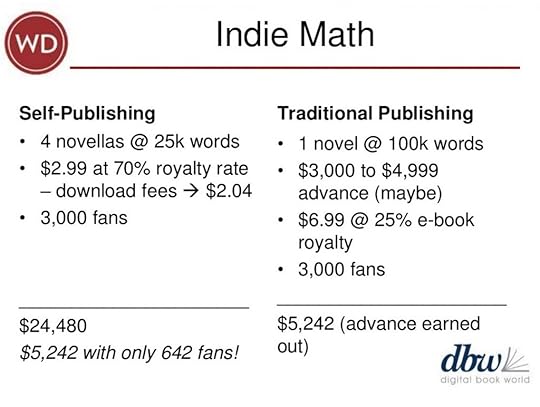
This slide, showing the kind of calculations an author may do in weighing traditional and self-publishing, is from Dana Beth Weinberg’s DBW 2014 presentation.
And here’s the verbiage that might have sent a few people diving under their chairs at the Sheraton:
Self-publishing has broken publishers’ monopoly on the book industry. While publishers are used to asking what authors can do for them, they are suddenly being asked what they can do for authors.
Before I could get my shoe off to pound it on the DBW Tweet Command Center console, Weinberg deftly had moved us on to some soothing qualification.
Publishers don’t need to worry about all of self-publishing. There are a lot of hacks and hobbyists out there, focused on writing their memoirs or the one book they have inside them. There are also determined entrepreneurs, who are finding ways to make money in self-publishing, and there are runaway bestsellers. The entrepreneurs and bestsellers, rather than being a threat, provide great opportunities to publishers. These authors have demonstrated their market potential without the publishers having to invest a penny, and under the right terms, they may be happy to partner with traditional publishers. Under the right terms.
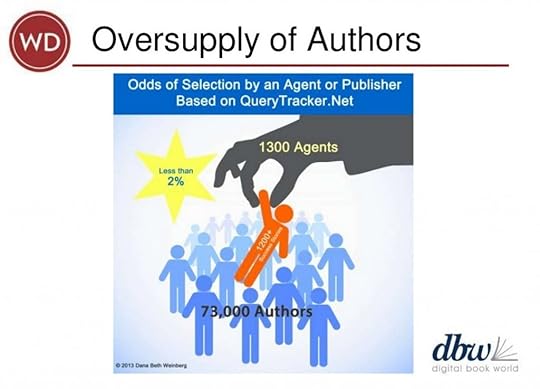
In this slide for DBW 2014, Dana Beth Weinberg looks at the kind of odds QueryTracker.net, an author-submission service, indicates are faced by writers looking for traditional publishing.
No one was feeling too comfy, though:
The biggest threat to publishers are the hybrid authors, who move from traditional publishing into self-publishing. While publishers work hard to keep their name-brand authors from defecting with sweet enough deals to keep them happy, midlisters in the past have been neglected. These are the people for whom self-publishing may be increasingly attractive…
@porter_anderson@amazon has saved many midlist careers, and built others into pro status. #EtherIssue
— James Scott Bell (@jamesscottbell) January 17, 2014
And here is when the room erupted in chaos. Just kidding! Everyone remained seated and retained her or his dignity. The emphasis is mine:
Readers’ relationships are with authors and their stories. No one really cares who the publisher is. The traditional author who goes indie quickly becomes the publisher’s competition. In the 2014 Digital Book World and Writer’s Digest Author Survey, 5% of authors fit this profile or more than a third of traditionally published authors. All indications are that this number is growing.
If anything, an eerie calm had settled over the room, as if we were watching a newsreel from another era, or maybe a family drama on television in an unknown language without subtitles:
It’s no surprise that authors are asking what traditional publishers offer. The results from the 2014 Digital Book World and Writer’s Digest Author Survey, which Jeremy Greenfield and I compiled, suggested that the contributions by publishers were not as much as the author community would seem to expect. We found strong similarities between what publishers offered and what authors could achieve on their own.
[image error]
In this slide for DBW 2014, Dana Beth Weinberg indicates the strong (deeper blue) preference for traditional publishing that was expressed by respondents to the self-selecting “What Authors Want” survey in all categories — aspiring, self-published, traditionally published, and hybrid authors.
Patiently, politely, the DBW audience heard out Weinberg, emphasis mine again:
I encourage publishers to rethink not only book contracts but the social contract they have with their authors. While income is an important concern for authors (as for all workers), it is not only or even in some cases the primary concern, suggesting that publishers have numerous avenues open to them for improving authors’ experiences and satisfaction with traditional publishing.
Weinberg recommended “partnership, empowerment, and collaboration as a way to retain authors and share in the benefits that new forms of publishing offer.” And in an echo of the survey’s original title, “What Authors Want,” Weinberg advised:
As a start, publishers should ask themselves what their authors need and want; what they can offer their authors; and what mutual benefits are possible.
“The high road leads to high success” Dana Beth Weinberg #DBW14 Inspiring.
— Mary Ann Naples (@manaples) January 15, 2014
Our “Bifurcating Future”
The riot police were wonderfully efficient. Okay, I’m making it up again. No Rite of Spring uprising overtook DBW. That placid bearing remained in place as Weinberg finished her talk and throughout the expertly assembled conference.
Honestly, however, I wished we had seen and heard more reactions “in the halls,” as we call the delightful networking, meet-and-greet fest that a good conference like #DBW14 creates between sessions.
Weinberg confirms my sense for the aftermath in her comments to me: “There wasn’t a lot of reaction after the talk, a small flurry of tweets and retweets and a couple of thank-you’s, especially for the Indie Math slide.”

Jason Allen Ashlock
It’s worth our attention to the relative quiet in instances like this presentation. I wonder if it doesn’t reflect something that Jason Ashlock—literary agent, consultant, and presenter of a lively, unprecedented workshop at DBW this year on new developments in author representation—has just written. More and more, we seem to be seeing tales of two industries. Ashlock:
Last week’s Digital Book World conference was as stimulating an event as one could ask for, with many different perspectives represented, and a remarkable array of tools and trends unpacked. But for the most part, the event choose not to tackle the world outside establishment publishing, which is exploding in ways the establishment cannot fully name or measure, and fragmenting in ways that resist any kind of mapping with the tools we’ve been using. (DBW’s programming was done excellently, of course: for paying attendees looking for programming that equipped and informed them, they found it. You can’t program for those not in the room.)
He’s responding to, as he notes it in his post’s headline, Eisler vs. Gottlieb + the rhetoric of the new publishing economy.
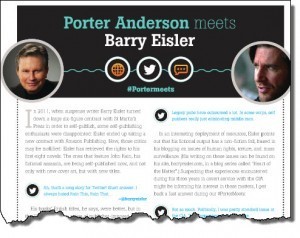 Brief background: I’d done one of my weekly #PorterMeets interviews with backlist-self-publishing author Barry Eisler for The Bookseller in London. When that interview drew the attention of literary agency Trident Media’s Robert Gottlieb, Eisler asked if he could respond in a blog post. The Bookseller’s editor Philip Jones was agreeable to Eisler’s request, and Eisler produced an extended response to Gottleib which ran under the headline, Authors Deserve Better.
Brief background: I’d done one of my weekly #PorterMeets interviews with backlist-self-publishing author Barry Eisler for The Bookseller in London. When that interview drew the attention of literary agency Trident Media’s Robert Gottlieb, Eisler asked if he could respond in a blog post. The Bookseller’s editor Philip Jones was agreeable to Eisler’s request, and Eisler produced an extended response to Gottleib which ran under the headline, Authors Deserve Better.
The original point-counterpoint attempt by Eisler and following commentary—which includes self-publishing author Joe Konrath in a wrily fun Congreve-worthy interchange with Gottlieb—are a study in folks talking past another.

Barry Eisler
Gottlieb seems to believe that Eisler publishes only electronically. That is incorrect, of course. Barry Eisler is published and publishes himself both in print and in ebooks. As he writes to Gottleib, “All my novels are available in digital and paper. Neither format is ‘original’ for me; neither is exclusive.”
But Gottlieb maintains that “Mr. Eisler has chosen to be an original ebook author. Nothing wrong with that.” Of course, Gottlieb then goes on to assert that there is something wrong, or at least unwise, with that, even though “that” is inaccurate.

Robert Gottlieb
It’s actually somewhat bizarre, at times frustratingly funny. But the darkening truth of it is brought home by Ashlock, talking about the Eisler-Gottlieb exchange at The Bookseller:
For some, this may seem tired territory, but to me, the two radically different worldviews reflected in this back-and-forth represent the point of departure for trade publishing’s rapidly bifurcating future.
“Publishing’s rapidly bifurcating future.”
Today, I invite you to consider that phrase. As Ashlock writes:
This conversation (if it can be called that, as Gottlieb seems not to be fully engaging most of Eisler’s points) helpfully illuminates the parallel world that spins alongside the establishment conversations. And for that, it’s worth reading and remembering.
I don’t care what either Konrath or Gottlieb has to say about much of anything, let alone about each other.
— Don Linn (@DonLinn) January 22, 2014
And I think Weinberg has opened a chance for us to consider the same issue. Does it seem at times that hopes of happy integration between traditional and new forces in publishing is fading? Is the industry’s future bifurcating? Has it happened already in that “parallel world” spinning “alongside the establishment” with such quickening power?
Weinberg in her comments to me concedes that she hadn’t foreseen the forcefully detailed objections led by the influential Howey to this survey’s author-earnings formulations in her early posts for DBW. She writes to me: “I was perhaps naive not to expect the animosity and anger that accompanied my first blog posts. Just as surprising was what people focused on as the main takeaway–the income gap between traditional and self-published authors.”
And she is an author, too, remember. Of ‘both kinds,” if you will. She’s that “hybrid” we talk about.
Now, she writes to me, graciously, as so many of us call for better, clearer, more openly harvested data:
None of the data I have are perfect; I’m not sure that data ever are. Sometimes the questions we ask and the way we ask them are as important, if not more so, than the immediate answers themselves. When the data change, the answers might too. But when we change our questions, we have the ability to change ourselves.
Howey has pointed out another survey to me, one created by author Beverley Kendall, again (I have confirmed with Kendall) non-scientific, again with a self-selecting sample, but written up with handsome transparency about its limitations and parameters. Such transparency is the least we can ask in the current climate of closely guarded data sets and sometimes veiled shortcomings. I hope to have more for you on the Kendall survey soon, and am glad Howey has brought it to light.
Meanwhile, let me leave you with Weinberg’s comment to me about the experience of self-publishing. If anything, it demonstrates why she went to DBW to speak about a “human contract” with authors. And it shows us that if “publishers’ monopoly” has been broken, that’s not always one big romp through the park. This isn’t that social (let alone anti-social) scientist speaking now. This is the author self-publishing for the first time, emphasis mine:
Putting my Russian mob thriller out for the world was mildly terrifying, except that no one could find it unless they knew where to look…I didn’t feel like celebrating. I thought I was going to hurl. In that moment, I had an intimate understanding of the findings in the survey related to authors’ disappointing experiences. Publishing is a hard, hard business. Still, you can count me in for the long haul.
Perfect advert? pic.twitter.com/fuJIvqzKGX
— Jonny Geller (@JonnyGeller) January 21, 2014
Main image – iStockphoto: ZimmyTWS
The post Is the “Publishers’ Monopoly” Broken? Writing on the Ether appeared first on Jane Friedman and was written by Porter Anderson / @Porter_Anderson.
January 17, 2014
How to Build a Writing Group in Your Community
Note from Jane: The following post by Nathaniel Kressen is the third in a series sponsored by Nook Press, offering tips and advice from authors on writing and publishing. Read earlier sponsored posts from Nook:
The Importance of Your Book Cover: Finding the Right Fit by Colleen Gleason
Why I Choose to Both Self-Publish and Traditionally Publish by CJ Lyons

This post is sponsored by Nook Press.
Writing for me has been anything but a solitary art form. It takes interacting with other writers to get the juices flowing. As a core member of the Greenpoint Writers Group in Brooklyn, I can experiment and push the boundaries of a story and get feedback in real time. And, perhaps most importantly, I witness the successes and setbacks of others on their journey, just as they witness mine. By uniting together, we drive one another to do our best possible work and also share resources. My work becomes an active and ever-growing part of the world rather than a secret project I hesitate to share.
So how can a writer who is just starting out find such a community?
One method would be entering an MFA writing program, but having come from an expensive undergraduate program myself, I can say it’s not advisable for everyone. A viable alternative is to explore the free or low-cost writing groups in your area, which can provide much of the same format as an MFA program—if set up correctly—but spare you the financial burden.
If you don’t live in a place like New York City where there are innumerable opportunities to find a group that suits your style, you can try establishing one yourself by approaching your local bookstore or library to see if they’d be willing to host meetings. There’s a good chance you’ll meet others in your area who are craving the same experience you are, so you’ll be providing a solution for them as well as yourself.
However, since many writing groups fold within the first few meetings, allow me to demystify the process.
As you start to seek members, you’ll need to consider what kind of group you want to belong to, and advertise for or seek members who want the same thing. Consider:
Frequency. Having a deadline compels a writer to produce more material than they might otherwise create if left to their own devices. Too much or too little time in between meetings can reduce the positive impact. In my experience, one week is too short of a turn-around time for a writer to absorb notes or create a body of new material, whereas one month can be too long and undercuts the urgency of the workshop, allowing the writer to procrastinate. Test out whether meeting every two weeks works for you and adjust as you see fit.
Group size. The benefit of having a small group is that everyone has the opportunity to participate in the discussion, but limiting the number of writers who can join will only prevent you from receiving fresh perspectives on your work. The good news is that the number of participants will fluctuate meeting by meeting early on, so there should be plenty of opportunities to experience both and decide what works best for the evolution of the group.
Structure. In some groups writers read their material aloud, but I’ve found that e-mailing work in the days prior proves more productive. First of all, it gives readers time to think about the material before offering feedback, and second, it presents work in the same way it’ll be seen by editors and agents.
Feedback. Some groups elect to have writers sit silently while receiving feedback, but this may limit the constructive dialogue that can happen. The trick is for the writer not to become defensive, and for the readers to stay focused on what the writer is seeking to accomplish rather than what they would do differently themselves. If the dialogue remains honest, open, and patient, it will prove useful to the writer’s process.
Once you’ve found some writers interested in forming a group and you start to figure out the basics referenced above, here are additional issues you’ll want to address.
How big will the group be allowed to get and how will you add new members? Fresh perspectives are just as essential to a writer’s development as having colleagues who know and stand behind your work. As the group grows, you’ll find it increasingly difficult to satisfy the needs of both new and longtime members. This is why, with the Greenpoint Writers Group, we started running both closed and open meetings, so that we could tailor the format to the people in attendance. You’ll see this discussed in greater detail below.
Will you charge fees to join? I think there’s no swifter way to kill a writer’s enthusiasm than by making them wonder whether or not they’re getting their money’s worth. That said, there are master classes out there taught by established writers that offer direction and inspiration that the average casual gathering might not—but those are more for your own journey as a writer. As the head of a group, I’d recommend keeping money out of the process unless it proves absolutely necessary to keep it going, noting that you don’t need a location that charges rent in order to hold a meeting. Anywhere with a lamp and chairs will do—or, chairs lacking, a floor.
Who will oversee the circulation of manuscripts and related critique materials? As the group’s founder you’ll most likely be tasked with managing the logistics, at least early on. In time, the enthusiasm and dedication of your peers will build and they’ll eagerly share the workload with you. However, it’s important from the get-go to make peace with performing modest tasks for the greater good. They will be time-consuming, but they are essential to the group’s survival. If you’re no fan of administrative work, you’re better off joining an established group than starting one of your own.
The format will evolve based on the needs and recommendations of its members, yet it must always remain a supportive and respectful environment. In short, both flexibility and structure are needed. I adopted this role for the Greenpoint Writers Group in 2010 after having found the group at random. Its founder moved out of the city and asked if I would be interested in taking over as its leader given my prior experience running a group for playwrights within a small theater company. I accepted and quickly encountered challenges.
When I started, there might be two or twelve people at any given meeting, without any way of knowing beforehand how many would show up. Long projects, such as a novel-in-progress, would have to be re-introduced at every meeting for new members, and readers would have to give feedback without having seen the previous material. We would also get writers who showed up to workshop their material only to never return.
We’ve found a way to avoid such situations and have the benefits of both a large and a small group: we run limited duration intensives. Members commit to attending every meeting, thereby creating a reliable and informed audience for everyone’s work. We make the intensive a recurring event and now the Greenpoint Writers Group operates on two levels—a semiannual 12-week Intensive dedicated to a limited group of writers, plus biweekly meetings open to anyone who wishes to attend. Active participants in the biweeklies have the option of applying to the next intensive, and our “core group” of writers has grown ever since we started. Through this format, we aim to encourage and develop the wide network of talent in our area while still providing a creative home for in-depth feedback.
There have been several incarnations of the GWG before we arrived at our current state, and it will surely continue to shift. Building a community takes time and fortitude, and for the dedicated writer, the best thing you can do is involve yourself in an art scene that feeds you creatively, even if you have to create it from scratch.

This post is sponsored by Nook Press.
The post How to Build a Writing Group in Your Community appeared first on Jane Friedman and was written by Nathaniel Kressen.
January 16, 2014
Now Arriving at #BEA14: Author Hub – Writing on the Ether
Table of Contents
A Challenge Met: BEA’s Author Hub
Working and Networking: Authors Rallying
A Quick Conference Note
A Challenge Met: BEA’s Author Hub

Dominique Raccah
NEW YORK — One of the closing sequences of publisher-to-publisher communications offered Wednesday from the stage of F+W Media’s Digital Book World Conference & Expo came from Sourcebooks‘ Dominique Raccah. And it had to do with failure.
Raccah jokes with me that the rest of us really just like hearing her talk about her failures. But nobody was laughing last evening when she went into a litany of what failure had come to mean to her, and might mean to the rest of us.
“Fear actually is the promise of getting it right tomorrow.” That woke up everybody.
Raccah’s lines rolled through the cavernous Metropolitan Ballroom, filled with more than 1,000 exhausted conference-goers.
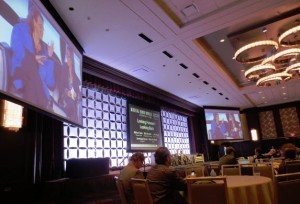
Dominique Raccah is onstage during this panel discussion Wednesday at Digital Book World Conference & Expo. Photo: Porter Anderson
And I’ll have more from the conference tomorrow, Friday, at Writer Unboxed.
Some of our colleagues who heard Raccah speak are going back into offices today to work on failure. Some of them represent imprints, sales initiatives, marketing schemes, book launches, educational programs, design concepts, and whole publishing houses that will, no doubt, meet with hard, resounding, costly failure.
But “a failure-free environment is an innovation-free zone,” Raccah told the hushed assembly. “We have to rethink failure. We need better data, better processes, and more transparency around every step in publishing,” she pressed on. In 2008, when things were particularly tough in her shop, she said, she’d found herself “a constant complainer.” And she changed that.
“Failure,” she said, “can be an opportunity to come together, to create and strive together. Failure can be a moment of inspiration. ”
Today, I can give you an example of what she’s talking about. 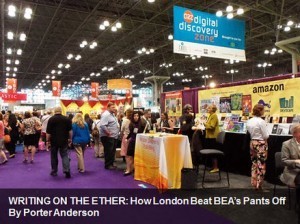
Last June, I ran an edition of the Ether at Publishing Perspectives headlined How London Beat BEA’s Pants Off. In it, I wrote about the London Book Fair’s (LBF) AuthorLounge initiative curated by Authoright as a place for entrepreneurial writers to gather, network, hold seminars, and even launch books—Orna Ross and her Alliance of Independent Authors (ALLi) launched its Choosing a Self-Publishing Service for authors there.
By contrast in the States, we had seen six particularly powerful entrepreneurial authors—Bella Andre,Stephanie Bond, Tina Folsom,Barbara Freethy, Hugh Howey, and CJ Lyons—spend thousands of dollars to take a booth of their own together at BEA, where there was no AuthorLounge program. 
I wrote about this here in Writing on the Ether in The Indies Are Coming! to BEA.
You may remember that the follow-up to all this included some very forthright, good-natured response from Reed Exhibitions’ Steven Rosato, who directs BEA.
In comments he wrote for the Ether at Publishing Perspectives, Rosato said:
Not only is BEA embracing and recognizing the entrepreneurial author, but we do an awful lot of great things for them to level the playing field, treating them for what they are: producers of great content that is looking to reach its audience.

Steven Rosato
And Rosato is proving himself as good as his word.
If some saw a failure in BEA last year to offer entrepreneurial authors a place at the publishing table like that LBF had provided, Rosato and his team saw the experience as an opportunity to rethink, revise, and renew.
“An opportunity to stop doing something else,” Raccah told the crowd in New York at DBW, “and start doing something else.”
That turns out to be a timely way to describe what BEA and Rosato now are committing to do, right on the floor of the huge trade show in New York. Rather than giving entrepreneurial authors no option except to take a booth like anyone else or have no material presence at BEA, the show this year is generating the dedicated author-services locus that’s been missing in the Javits Center until now.
The uPublishU Author Hub at BEA is being established as an operational, fully functioning home base for entrepreneurial authors at the heart of BookExpo America. Rosato has asked me to program the new development. And I want to tell you something about it now.
Working and Networking: Authors Rallying
 Thanks to the BEA staff’s fast work, I’m able to give authors a couple of links today to use in finding out more about what’s going on.
Thanks to the BEA staff’s fast work, I’m able to give authors a couple of links today to use in finding out more about what’s going on.
This is all new, by the way, you’ve missed nothing. Right out of the box. It’s easiest to give it to you in bullet points at this stage. Name of the new offering: uPublishU at BEA Author Hub
Why is “uPublishU” part of the name? Because uPublishU, the one-day (May 31) conference for authors produced by BEA each year, is a part of what every Author Hub member will get as part of his or her participation package. And uPublishU’s author-focused events are closely aligned with the Hub’s concept and intention. “uPublishU” is frequently abbreviated to “uPubU,” so you’ll see that in many places.
When will the Author Hub operate? All three days of BEA 2014: May 29, 30, and 31.
How many authors will be able to participate in the uPubU Author Hub? Only 160. In this first year’s outing, we want to be sure everyone participating gets the richest experience possible, so spots will be quite limited. 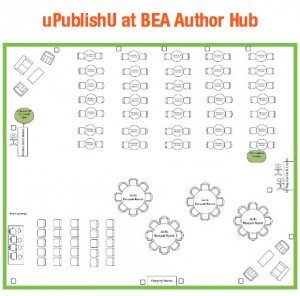
What’s in the uPubU Author Hub? The site on the trade show floor is a large space equipped with a presentation area for programs and author readings; comfortable lounge areas for networking conversations; a charging station; seminar tables for meetings with vendors of author services and other professionals; a receptionist’s desk at the entrance to the space, so visitors with whom you have appointments can find you efficiently; and tables and chairs designated for Premium members.
What levels of author membership are available? There’s a Basic membership and a Premium membership in the Hub.
Who should consider Premium membership? As an author, think of your readiness to face the marketplace. Do you have books out now? Are you self-publishing material that you’d like publishers, booksellers, agents, and others in the industry to be aware of? Would it be helpful to have your own high-visibility spot on the floor of BEA in which you could have meetings with industry folks about your work? Then Premium membership may be your best option. It includes a table and two chairs in the Author Hub itself. It also comes with a full-fledged Author Autograph Signing session (exactly the session publishers buy for their authors). Premium membership (limited to 35 authors) is for the most fully engaged career authors, those who are up, running, and fully functioning as the business people and creative workers we’re seeing rise today, the most effective, self-directed writers among us.
Who should consider Basic membership? This is for authors who are ready to connect into that world of the fully vested entrepreneurial careerist. In fact, one of the best advantages of this membership may be the chance to meet and talk with some of the most successful such authors we have today. Maybe you’re still building your own inventory of books. Maybe you’re not yet hitting the sales levels of the Million Kindle Club writers (like the “indie Six”), but you’re ready to network your way closer to that realm. The Basic membership will include all the specialized programming we’re bringing into the Author Hub. Some events will feature those high-sales writers who have come to symbolize the “new author.” Other events will feature leading figures and author-service vendors from the industry (the whole pantheon is at BEA, after all) in presentations, interviews, and close-up exclusive conversational forums in which authors can confer on specific, detailed questions and get the responses they need from the experts.
What sort of access does the Author Hub offer? Both levels of uPubU Author Hub membership come with a full BookExpo America badge for access to the trade show floor and Hub; a uPublishU Conference badge; access for your work to the New Title Showcase; a big round of listings (as a Hub Author, on the BEA Show Planner, in mobile listings, etc.); and all the programming events being put together for it. One of the most interesting effects of the Hub’s presence may be the chance for BEA’s “Power Readers”—book-loving members of the public—to meet Hub authors and learn about their books.
What are the prices? Basic Hub membership is $599 and Premium Hub membership is $1,200
The uPublishU Author Hub details are laid out on an informational PDF here.
Note that to register for one of the 160 spots in the May 29-31 Author Hub, you’ll need to be in touch with BEA’s Fred Evanko at 203-850-5965 or fevanko@reedexpo.com.
If you’d like to simply register for the May 31 uPublishU conference, not the Author Hub, that can be done online here.
And I hope you’ll give this new BEA initiative your serious consideration.
Raccah, at DBW on Wednesday, probably nailed it best when she said, “Sometimes failure signals a much bigger opportunity.”
I’m impressed with the serious, focused attempt that Rosato and his associates at BEA are making to create that “much bigger opportunity” for authors at the country’s biggest and highest-visibility trade show for the industry. “I stopped thinking about it as ‘us-vs.-them,’” Raccah said. “I started thinking of it as, ‘How do we put the company together?’”
There’s a chance at BEA this year to see a step made toward putting the industry together. Our authors—traditionally publishing, self-publishing, or both—for the first time will have a place, a locus, a center of their own fast-widening gravity in the business. This is new, this is valuable, and I want to commend Steve Rosato, Reed, and the BEA staff for going to such admirable lengths to work on being sure that this year, there’s no failure when it comes to including authors in the trade’s main event.
A Quick Conference Note
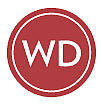 Many writers have been asking me about dates for the popular Writer’s Digest conferences in 2014. During DBW, I was given those dates and the go-ahead to share them with you so you can start planning, should you be interested in joining us there. Details about the conferences are still to come, but for your calendar, both are in August this year:
Many writers have been asking me about dates for the popular Writer’s Digest conferences in 2014. During DBW, I was given those dates and the go-ahead to share them with you so you can start planning, should you be interested in joining us there. Details about the conferences are still to come, but for your calendar, both are in August this year:
Writer’s Digest Conference East in New York will be held August 1-3 at the Roosevelt Hotel.
Writer’s Digest Conference West in Los Angeles will be two weeks later, August 15-17, at the Hyatt Century Plaza.
Back to Table of Contents Main image – iStockphoto: blnd
The post Now Arriving at #BEA14: Author Hub – Writing on the Ether appeared first on Jane Friedman and was written by Porter Anderson / @Porter_Anderson.
January 13, 2014
Does Your Story Have Flaming Chainsaws?
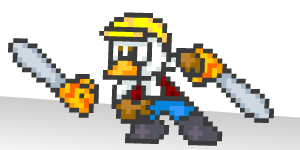
Chainsaw Chuck by The Static Cling / via Deviant Art
What makes a novel compulsively readable? Author and professor Benjamin Percy set to find out when The Girl With the Dragon Tattoo became a sensation several years ago. He describes a process he used to analyze the book’s structure:
I began to color code the major problems the characters faced—blue, black, red, green, yellow, pink, purple—and to track page numbers. Larson would introduce a blue problem on page 25, return to it on 78, 169, 240, 381, and so on, each time ratcheting up the tension and complicating things further. Interspliced with the blue problems were red problems, pink problems, a kaleidoscope of trouble, ever-changing.
I have come to call these flaming chainsaws. Your success as a storyteller has to do with your ability to juggle them. Every time the flaming chainsaws pass through your hands, they gain speed, become more perilous, until at last they are extinguished.
Read all of what Benjamin has to say in his essay “The Dance of the Flaming Chainsaws,” over the new Glimmer Train bulletin.
At this month’s bulletin you’ll also find:
Barbara Ganley: On Learning to Tell It True
Benjamin Percy: The Dance of the Flaming Chainsaws
Dawn Sewell McKeever: Write Like Hemingway
Rachel Cantor: On Roman Architecture and Crayon-Colored Sleeping Togs
The post Does Your Story Have Flaming Chainsaws? appeared first on Jane Friedman and was written by Jane Friedman.
January 9, 2014
#DBW14 – The Biz of Books: Writing on the Ether
Table of Contents
Giving the Business the Business
The Day Before
When the DBW Plenary Convenes
Seattle Scrutinized
Parting Glances
Giving the Business the Business
 At some point during each year’s Digital Book World Conference & Expo (DBW), every one of us is probably tempted to stand up and ask the room, “Yes, but has anybody read a good book lately?”
At some point during each year’s Digital Book World Conference & Expo (DBW), every one of us is probably tempted to stand up and ask the room, “Yes, but has anybody read a good book lately?”
Ironically, there may be more than 1,000 attendees there who, in fact, have read a good book lately. Maybe a whole lot of good books. Maybe a few not-so-good ones, too.
But that isn’t what’s on the table at DBW. And even as many in the author corps are beginning to wonder if we’ve let the digital disruption focus too much writerly attention on business matters—here’s agent Rachelle Gardner’s quick comment on last week’s Ether—the annual Digital Book World conclave is a moment for exactly such a concentration.
That’s hardly because DBW is doing anything wrong. DBW’s business is the business. That’s its mandate. This is where the industry! the industry! gets together to be just that! just that! 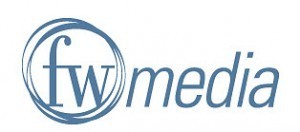
And DBW’s producers at F+W Media may take the mission even more seriously than usual next week: this DBW takes place in a winter without a Tools of Change (TOC) conference from O’Reilly Media.
The two great US industry ice-time events (preceding the late spring’s BookExpo America trade show and conferences) had become perceived as rivals, although they were quite different in their tones and approaches to the impact and potential of the digital dynamic in publishing.
I've gone from being gutted about missing #dbw14 to being pretty smug that I'm staying in the warmth of the UK!
— Laura Austin (@LauraAustinNow) January 7, 2014
As DBW has moved to capitalize on its survivor status since O’Reilly Media closed TOC, one of the first headliners announced was Tim O’Reilly, himself, who’ll be onstage on Tuesday morning (10:40 a.m. ET) with a presentation titled “The Real Book Revolution is Just Beginning.”
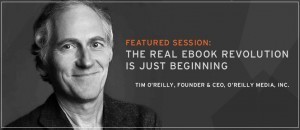 And if you haven’t followed along in the past as one or both of these large gatherings sat down in Midtown Manhattan, I recommend you keep an eye on this one.
And if you haven’t followed along in the past as one or both of these large gatherings sat down in Midtown Manhattan, I recommend you keep an eye on this one.
If you can be with us at the Sheraton New York Hotel & Towers, there are still seats to be had, but move very quickly. My code PORTER14 will save you 5 percent on a full registration or the Total Access ticket. For a catering headcount at the Digital Book Awards evening presentation on January 14, you should make that ticket’s buy today, Thursday, as this Ether moves.
If you’re not able to be on site, I suggest you set up a stream on the Twitter dashboard you like best for hashtag #DBW14. At this writing, more than 1,300 tweets already have been logged on the hashtag.
My own live coverage begins at 9 a.m. ET on Monday (that’s 2 p.m. GMT, 3 p.m. CET, and 6 a.m. Pacific)—I’m about to give you a quick overview of some of the high points.
For the socially mediated: Be sure to watch the widest array of tweets hashing #DBW14 you can: there are things to be learned, especially in who tweets and who doesn’t. Many publishing executives still don’t have active Twitter accounts, despite the now-accepted understanding that direct communication with the readership is a new fact of digital life.
Does it make me (more of a) Philistine if I don't want any wearable tech?
— Don Linn (@DonLinn) January 7, 2014
There are times at the conference when executives onstage will be busily discussed in real time by the DBW attendees—and by the vast publishing tweeterie in many countries—and those executives, themselves, will not be aware of the debate raging around and about them. Think about that.
Enjoying a fine Sauvignon Blanc while refining my #dbw14 workshop slides and fighting off a cat who wants to steal my chips.
— Colleen Cunningham (@BookDesignGirl) January 9, 2014
The Day Before
In recent years, conferences and trade shows have added pre-event activities, expanding their offerings and audiences. DBW14 has become a model of this approach.
The actual conference is on Tuesday and Wednesday, January 14 and 15.
But on Monday, the 13th, DBW14 offers: 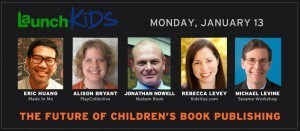 - Launch Kids, a one-day children’s literature edition of DBW Conference Chairman Michael Shatzkin and Michael Cader’s Publishers Launch series of conferences
- Launch Kids, a one-day children’s literature edition of DBW Conference Chairman Michael Shatzkin and Michael Cader’s Publishers Launch series of conferences
- Making Information Pay for Higher Education, a daylong co-location to the Sheraton of the Book Industry Study Group’s (BISG) conference
- A DBW Digital Design & Production Conference on ebook implementation
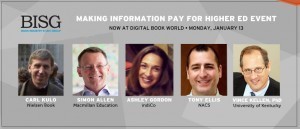 - A series of workshops that include:
- A series of workshops that include:
Jason Ashlock’s leadership of a particularly savvy workshop entry, “Driving Agency Growth: Fresh Case Studies, Models, & Tools for Agents & Managers” with DeFiore & Company’s Brian DeFiore, Stonesong’s Ellen Scordato, the Nelson Literary Agency’s Lori Bennett, Park Literary’s Abby Koons, Lucinda Literary’s Lucinda Blumenfeld, Emily Loose, and Arthur Klebanoff of Rosetta. This is the first-ever gathering of agents at DBW, as Ashlock writes in his piece, Risk-takers, Rule-breakers, Engineers: 6 Stories of Agents in Transition .
Platforms participating in this workshop include Pubslush, BookBub, Thought Catalog, Pressbooks, Vook, Atavist, Bookigee, Goodreads, Oyster, and BookShout. And I’ll be doing Monday’s live @Twitter #PorterMeets interview for London’s The Bookseller with agent Juliet Mushens of The Agency Group from the workshop site — the writeup on it will be on the stands Friday the 17th.
Jellybooks’ Andrew Rhomberg and Wattpad’s Ashleigh Gardner in “Finding and Building an Audience: On Discovery and Discoverability”
The Copyright Clearance Center’s Michael Healy and colleagues in “Licensing Copyright in the Digital Age”
- And more workshops later in the day
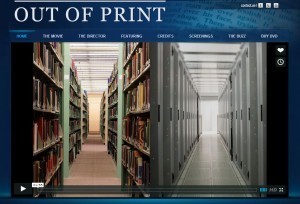
Out of Print is a film by Vivienne Roumani featuring Meryl Streep, Jeff Bezos, Ray Bradbury, Open Road Media’s Jane Friedman, Jeffrey Toobin and many others.
- A 5:30pET showing sponsored by Vook and Code Mantra at the Sheraton of Vivienne Roumani’s short film Out of Print on Monday evening with a panel featuring Roumani, Open Road Media’s Jane Friedman, POE Communications’ Ira Wolfman, author Darcie Chan, and DBW’s Jeremy Geenfield.
(This is event is open to the public—you don’t have to be registered for DBW14. Its $75 ticket benefits the Goddard Riverside Community Center.)
On the whole, DBW’s pre-conference Monday now has become a day packed with more events and expert input than many entire official conferences feature, and this is before the “real” DBW even gets under way.
That happens Tuesday.
So I'm one of "6 esteemed publishing professionals from around the world" #dbw14 quite exciting! http://t.co/kqzW9q7qq5
— Justine Solomons (@JustineSolomons) January 8, 2014
When the DBW Plenary Convenes
As with so many things this time of year, Mike Shatzkin’s programming tends to place a lot of emphasis on prediction. Here is the schedule.

Mike Shatzkin
Immediately after his own opener on Tuesday (8:35 a.m. ET), “The Past, Present, and Future of the Publishing Industry,” Shatzkin has scheduled his traditional CEO Roundtable, led by Publishers Lunch’s Michael Cader with F+W’s David Nussbaum, Tim O’Reilly ahead of his own talk, Simon & Schuster’s Carolyn Reidy, and Sourcebooks’ Dominique Raccah. Their topic: “The Executive’s View of the Future.” It’s probably a surer bet that we can look at what has gone before us. And for that, there are sessions such as:
Nielsen’s Jonathan Nowell and Jo Henry’s “The Winds of Change: Understanding the Global Book Market” (10:14 a.m. ET);
Shatzkin’s own presentation of results from a DBW Publishing Technology and Start-up Survey (10:55 a.m. ET);
Peter Hildick-Smith of Codex with a report on “Branded Authors: What Every Publisher Needs to Know (11:20 a.m. ET); and
That much-discussed report on Wednesday (10:30 a.m. ET) from Writer’s Digest’s Phil Sexton, an update of the WD-DBW survey “What Authors Want: Understanding Author Priorities in the Self-Publishing Era.”
 (That last one, the report from DBW’s sister vertical WD has drawn new heat from the author community for the way it develops statistics purportedly on author earnings in the traditional, self-publishing, and “hybrid” realms—a problem not of bad intentions, mind you, but of inadequate data inaccurately expressed. For more on that controversy, led by author Hugh Howey, see our coverage here in Writing on the Ether: Where Publishing Surveys Cannot Go. )
(That last one, the report from DBW’s sister vertical WD has drawn new heat from the author community for the way it develops statistics purportedly on author earnings in the traditional, self-publishing, and “hybrid” realms—a problem not of bad intentions, mind you, but of inadequate data inaccurately expressed. For more on that controversy, led by author Hugh Howey, see our coverage here in Writing on the Ether: Where Publishing Surveys Cannot Go. )
Queens College CUNY Sociology Prof. Dana Beth Weinberg follows Sexton on the topic of the survey in a talk titled “Should Traditional Publishers Feel Threatened by the Potential of Self-Publishing?” (10:45 a.m. ET)
In a new article for DBW, 2014 Author Survey: Indie Authors and Others Prefer Traditional Publishing…Slightly, Weinberg very carefully acknowledges that the survey sample is self-selecting:
The survey sample is a non-scientific sample, since it is voluntary rather than a random sample. The authors, most of whom responded after receiving a notification from Writer’s Digest about the survey, may not be representative of the population of authors.

Dana Beth Weinberg
Both Weinberg and others with DBW have been careful to note the limitations of the survey’s scope and rigor, in their admirable effort to gather the kind of data so severely lacking around the author experience in publishing today.
It’s interesting to find Weinberg reporting that writers who responded to calls to complete the survey (a big pool of 9,210) reported that they were, for the most part, not yet published (5,972). Self-published authors responding, Weinberg writes, numbered 1,636; traditionally published authors accounted for 774 responses; “hybrids” who publish both ways, numbered only 598.
While Weinberg clarifies that the respondents’ input “did not represent a clear win for traditional publishers,” she finds that “relatively few authors indicated that self-publishing would be their first choice for how to publish their next book, but neither were most authors set exclusively on taking a traditional publishing route.”
She writes:
Despite the rise of self-publishing and the enthusiasm with which self-published authors celebrate its ascendance, overall, the authors surveyed are more interested in traditionally publishing their next book. The greatest preference for traditionally publishing was reported by traditionally published authors (87.2%) followed by not-yet-published authors (76.8%). Among authors who have self-published, more than half hoped to publish with traditional publishers—53.5% of self-published authors and 57.8% of hybrid authors.
Weinberg also notes that a written survey report will be released during the conference.
And of special interest on Tuesday afternoon: Twinned sesssions crafted by Shatzkin to follow up on his and Peter McCarthy’s study of marketing in the digital age and, especially, of publishing’s frequently uneasy relationships with its start-up community.
At 2:30 p.m. ET on Tuesday, Shatzkin has programmed “Start-ups Working with Publishers” with Jellybooks’ Andrew Rhomberg; BookShout’s Jason Illian; Readmill’s Henrik Berggren; Librify’s Joanna Stone Herman; and DBW’s busy Jeremy Greenfield. (Don’t let me write Libifry when I tweet this—you know how I love these start-ups’ cutesy names.)
At 4 p.m. ET on Tuesday, that start-ups’ panel is followed by the other side: “Publishers Working with Start-ups” with Perseus’ Rick Joyce; HarperCollins’ Leslie Hulse; Publishing Perspectives Editor in Chief Edward Nawotka; McGraw-Hill’s Stephen Laster; and Workman’s Andrea Fleck-Nisbet. (Special kudos to this group — every one of them has a Twitter handle, and thus coverage of them will be digitally amplified and available with far more effectiveness than will panels that feature Twitter refuseniks.)
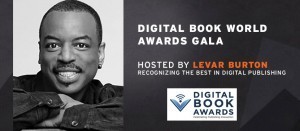 Tuesday ends with a revamped delivery of the renamed Digital Book Awards, this year with Rainbow Reading’s LeVarBurton hosting the announcements of prizes determined by Anne Kostick’s jury of experts.
Tuesday ends with a revamped delivery of the renamed Digital Book Awards, this year with Rainbow Reading’s LeVarBurton hosting the announcements of prizes determined by Anne Kostick’s jury of experts.
The program has been moved to the evening (from an original lunchtime spot) and includes a plated dinner and a rich roster of nominees.
So apparently getting a Cronut is quite the process – I will be live tweeting my attempts next week. http://t.co/VzYlbF2a9v #DBW14 #Cronut
— Publishing@SFU (@learnpublishing) January 9, 2014
Seattle Scrutinized
 Amid many other high points, one to watch for is Wednesday morning’s Amazon focus. This, clearly, is a logical offshoot of Shatzkin’s very interesting drawing a line in his recent essay, Nine places to look in 2014 to predict the future of publishing. In that piece, he writes:
Amid many other high points, one to watch for is Wednesday morning’s Amazon focus. This, clearly, is a logical offshoot of Shatzkin’s very interesting drawing a line in his recent essay, Nine places to look in 2014 to predict the future of publishing. In that piece, he writes:
It has been happening quietly but it has been happening: we increasingly have two separately-operating book businesses: Amazon’s and everybody else’s. This starts with the numbering system: Amazon uses its own ASINs, rather than depending on everybody else’s ISBNs. It extends to the titles available: Amazon has an untold number, but certainly hundreds of thousands, that it either publishes exclusively or which authors or small presses publish exclusively through them. And it has service offerings from Kindle Owners Lending Library to its recent Matchbook offer to pair ebook and print sales, which range from “extremely difficult” to “impossible” for any other publisher-retailer combination to match. How far can this go? Can Amazon create a closed world which is more profitable for an author or publisher than the whole world that includes everybody else? Or have they already?
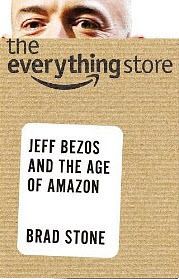 To look at this Amazonian basin—vs. everybody else’s—Shatzkin has a string of events led by journalist and author Brad Stone, speaking as he did at The Bookseller’s TheFutureBook Conference, from his book, The Everything Store: Jeff Bezos and the Age of Amazon. (8:35 a.m. ET)
To look at this Amazonian basin—vs. everybody else’s—Shatzkin has a string of events led by journalist and author Brad Stone, speaking as he did at The Bookseller’s TheFutureBook Conference, from his book, The Everything Store: Jeff Bezos and the Age of Amazon. (8:35 a.m. ET)
Stone, whose talk is dubbed “Amazon’s ‘Everything’ Strategy” (and my olive oil sprayer is being delivered today) is followed by Enders analyst Benedict Evans, who titles his talk a brisk “Deconstructing Amazon.” (8:50 a.m. ET)
Consultant Joseph Esposito then speaks on “Amazon’s Growing Share of the Institutional Market.” (9:05 a.m. ET)
And the three speakers then gather with Shatzkin for a group talk with that predictive slant again, of course: “The Future of Amazon and the Publishing Business.” (9:15 a.m. ET)
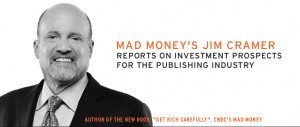 Speaking of business—and does the man ever speak of anything else?—CNBC’s Jim Cramer is due onstage at 11 a.m. ET Wednesday with a 15-minute presentation, “Mad Moneys Jim Cramer Reports on the Investment Prospects for the Publishing Industry.” Send Kleenex.
Speaking of business—and does the man ever speak of anything else?—CNBC’s Jim Cramer is due onstage at 11 a.m. ET Wednesday with a 15-minute presentation, “Mad Moneys Jim Cramer Reports on the Investment Prospects for the Publishing Industry.” Send Kleenex.
And an Amazonian tack returns at 11:25 a.m ET when GigaOm’s Laura Hazard Owen leads a Q&A with Stone, Esposito, and Evans.
brief break from mat leave – I'll be moderating AMZN panel with @BradStone @JosephJEsposito @BenedictEvans at DBW http://t.co/F4KYWKmmbJ
— Laura Hazard Owen (@laurahazardowen) January 7, 2014
Parting Glances
Near the end of the conference on Wednesday, two of the most telling presentation titles appear on the schedule.

Dominique Raccah
Sourcebooks’ founding CEO Dominique Raccah—named Most Inspiring Digital Person in Publishing at November’s FutureBook in London—gives a talk based in her own experiences titled “Rethinking Failure: Finding the Opportunities in Our Challenges.” (4:20 p.m.)
And Inkling founding CEO Matt MacInnis titles his talk, immediately preceding Raccah at 4:05 p.m. ET, “Putting Publishers Back in the Driver’s Seat.”

Matt MacInnis
Now, that title is intriguing because many publishers have said they were never out of the driver’s seat. Maybe changing gears, yes, but not steering things?
Or are we still in predictive mode? And if we are, then who is getting into that commanding position that publishers, we must assume, want to re-inhabit? I’ll give you three guesses and the first two don’t count. But I wonder if that’s what our good colleague MacInnis is going to talk about.
Should be interesting, huh? Keep an eye on us.
#DBW14. The tweet storm is rising.
@paulbogaards I have no idea what this means.
— Ginger Clark (@Ginger_Clark) January 5, 2014
@paulbogaards oh, thank god.
— Ginger Clark (@Ginger_Clark) January 5, 2014
Main image – iStockphoto: PojoSlaw
The post #DBW14 – The Biz of Books: Writing on the Ether appeared first on Jane Friedman and was written by Porter Anderson / @Porter_Anderson.
Jane Friedman
- Jane Friedman's profile
- 1882 followers



